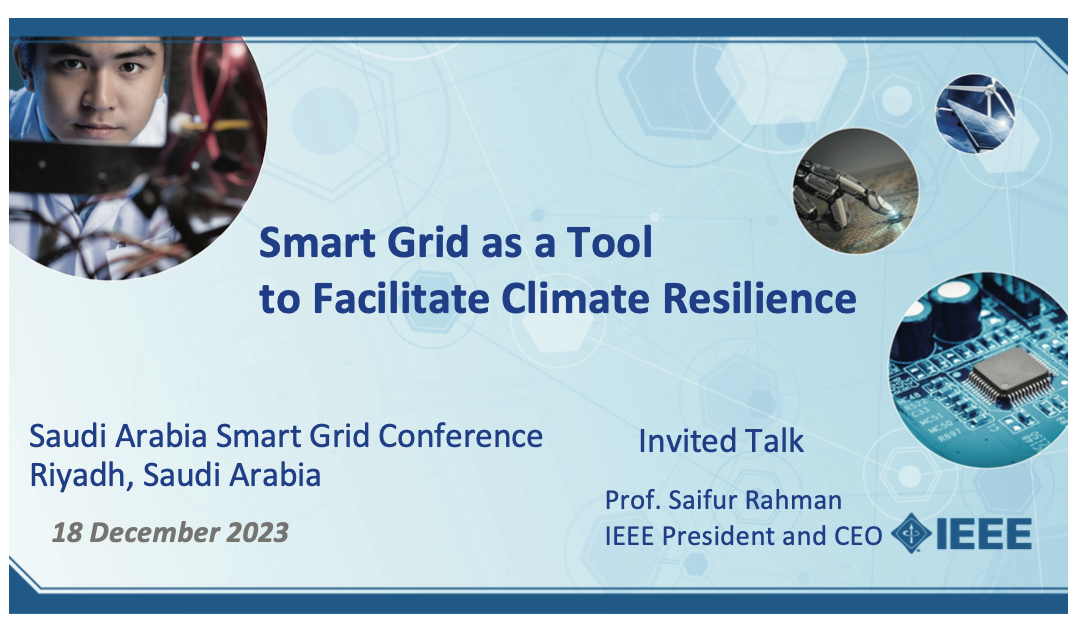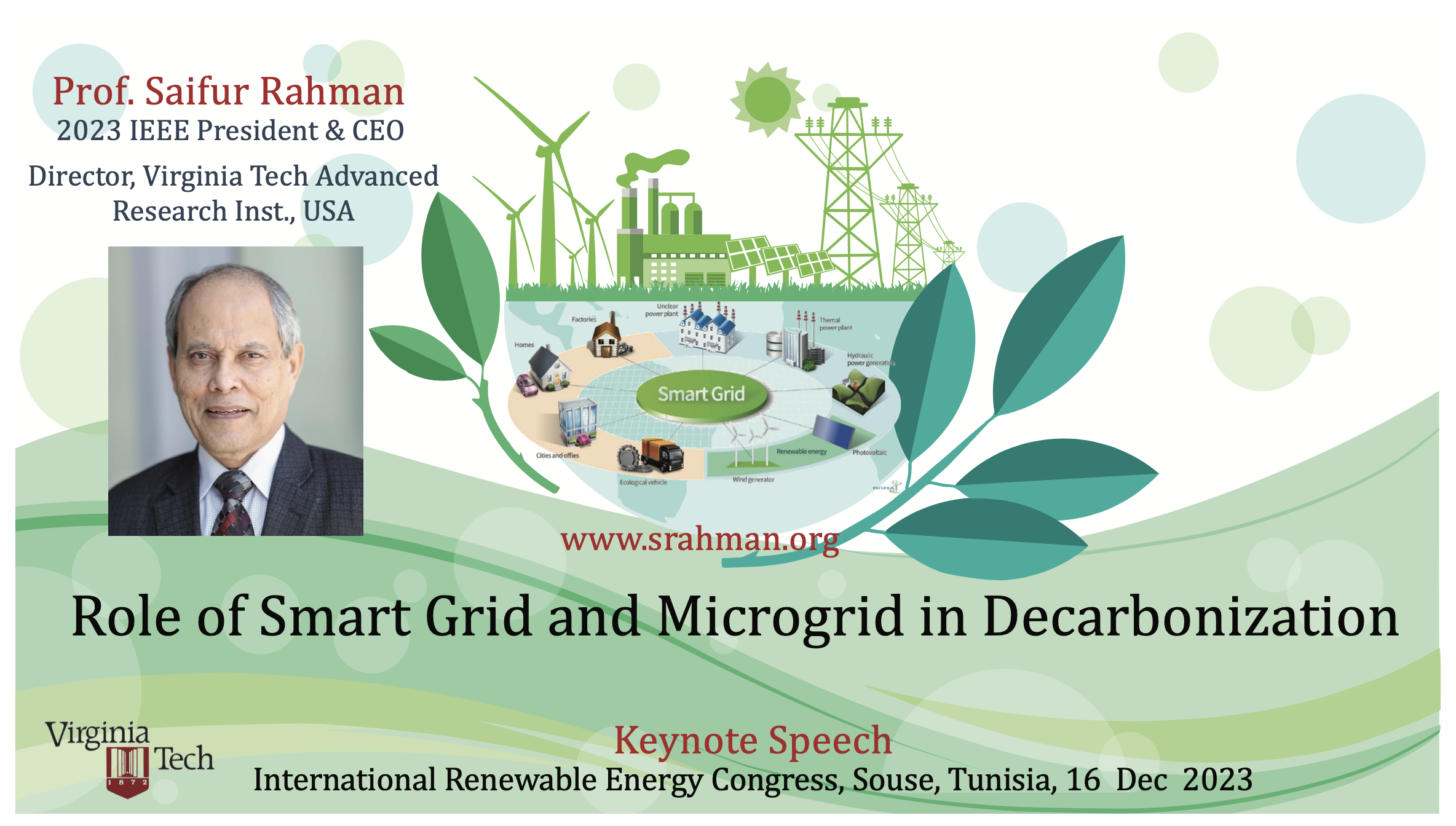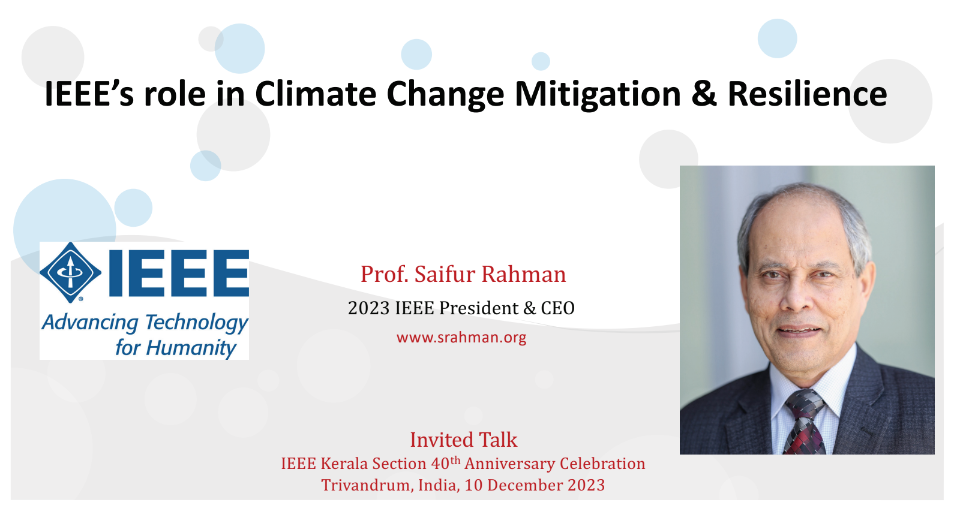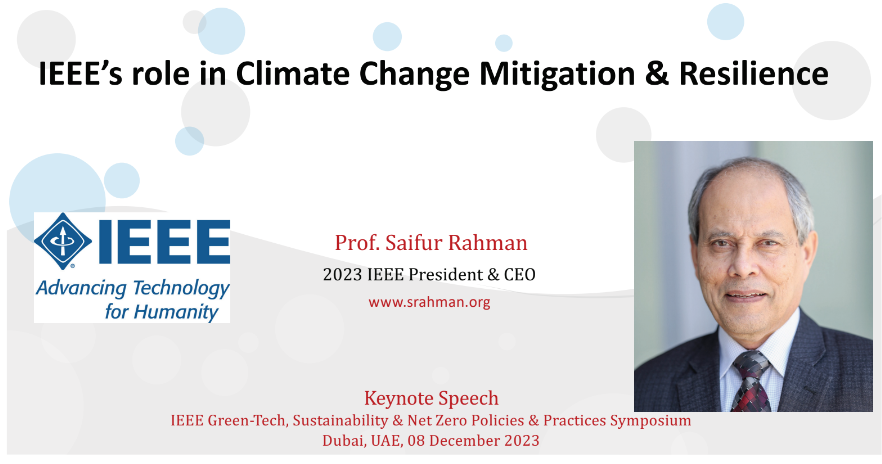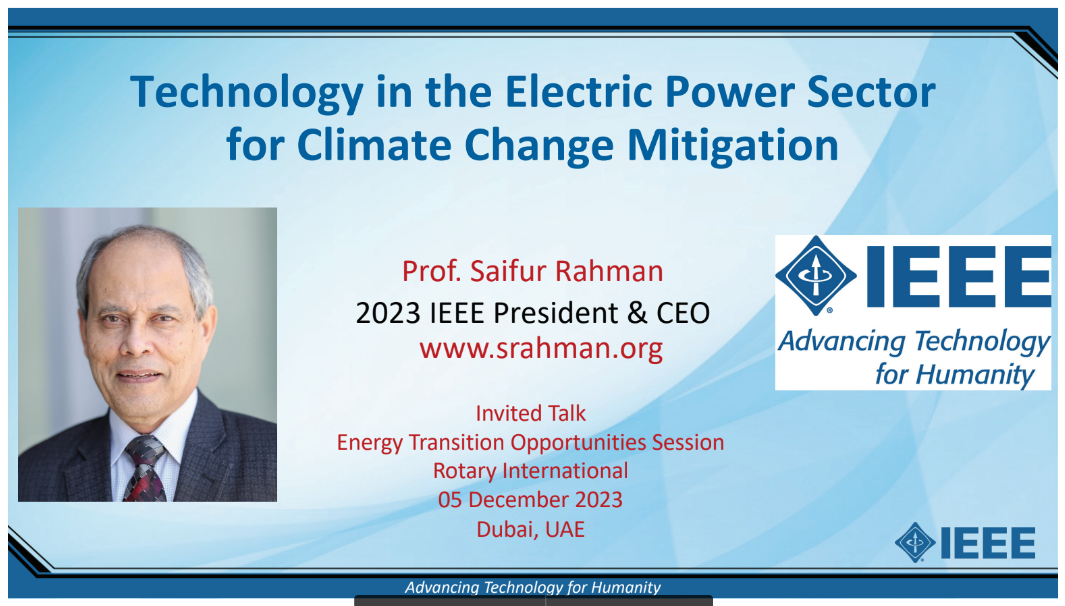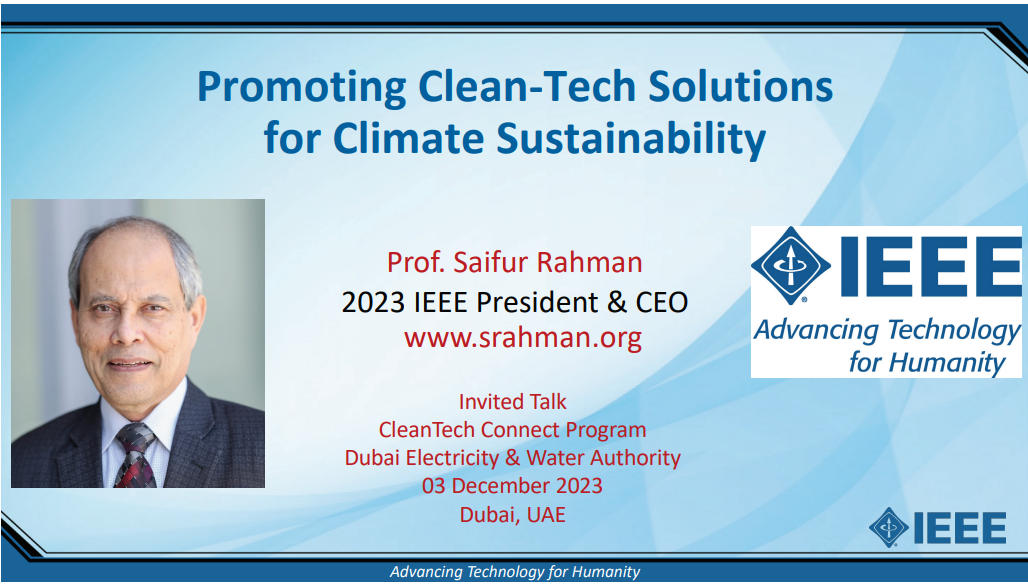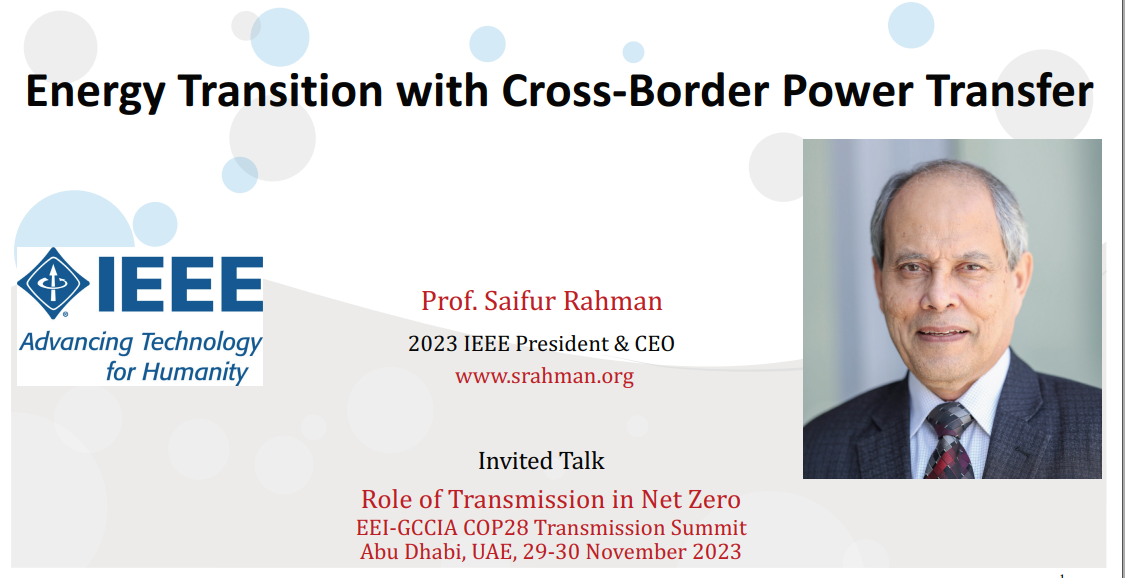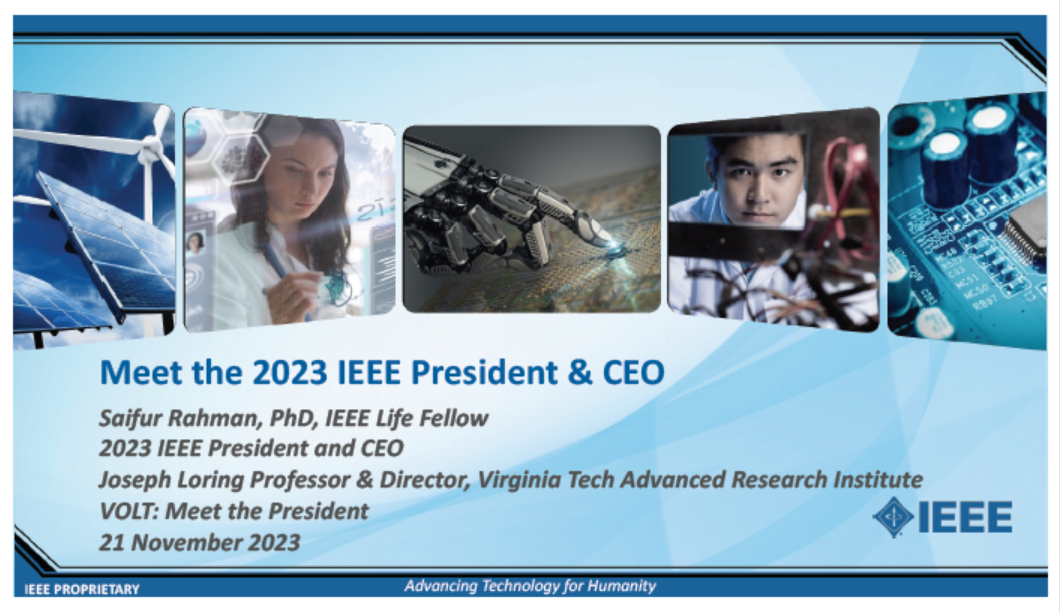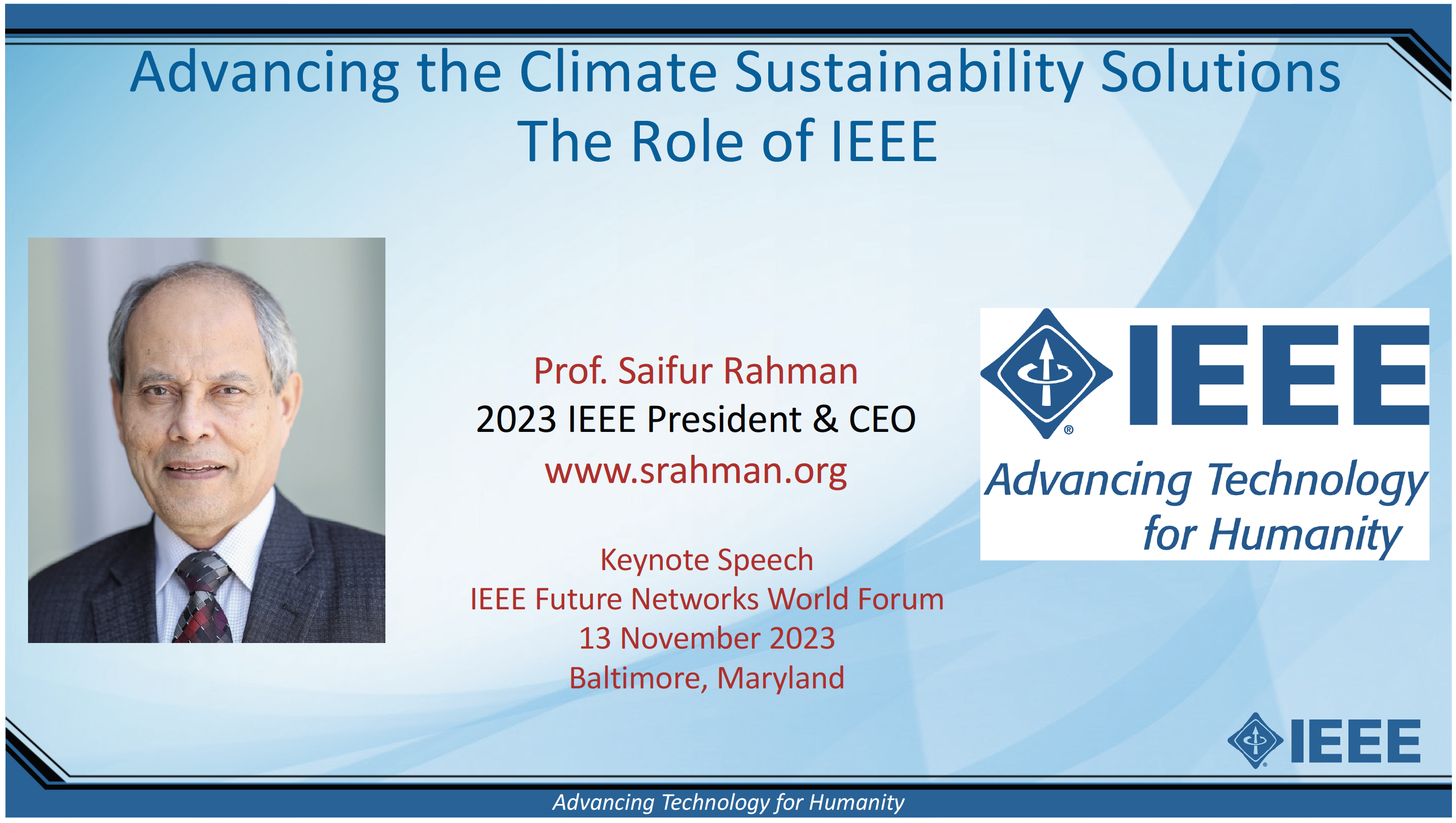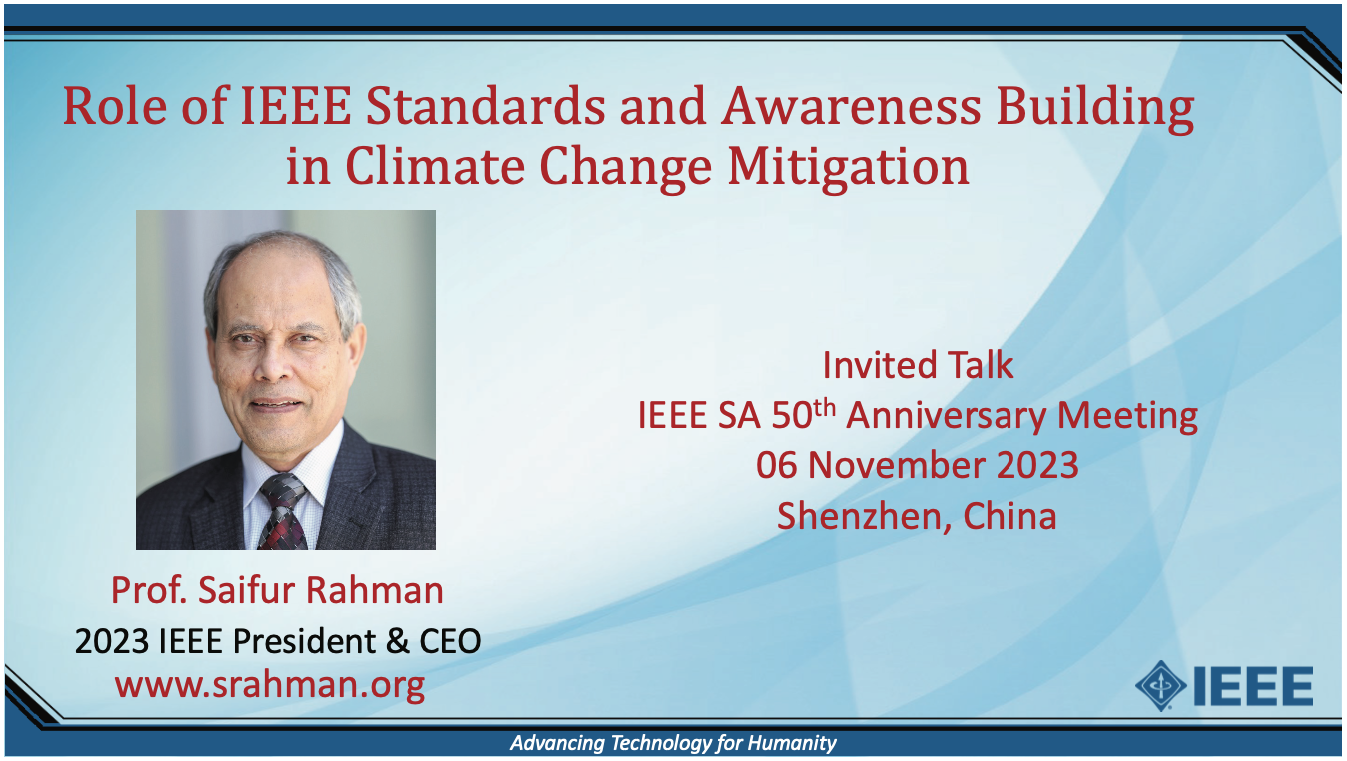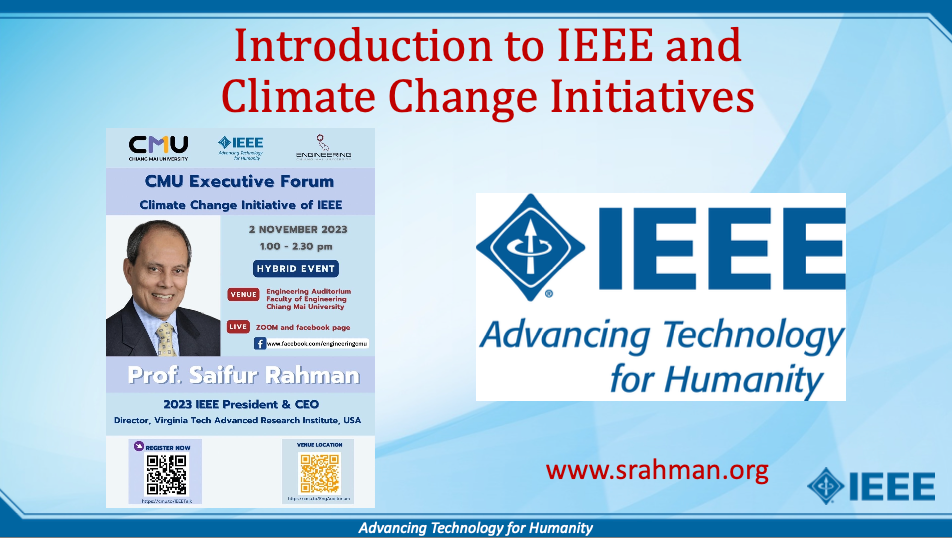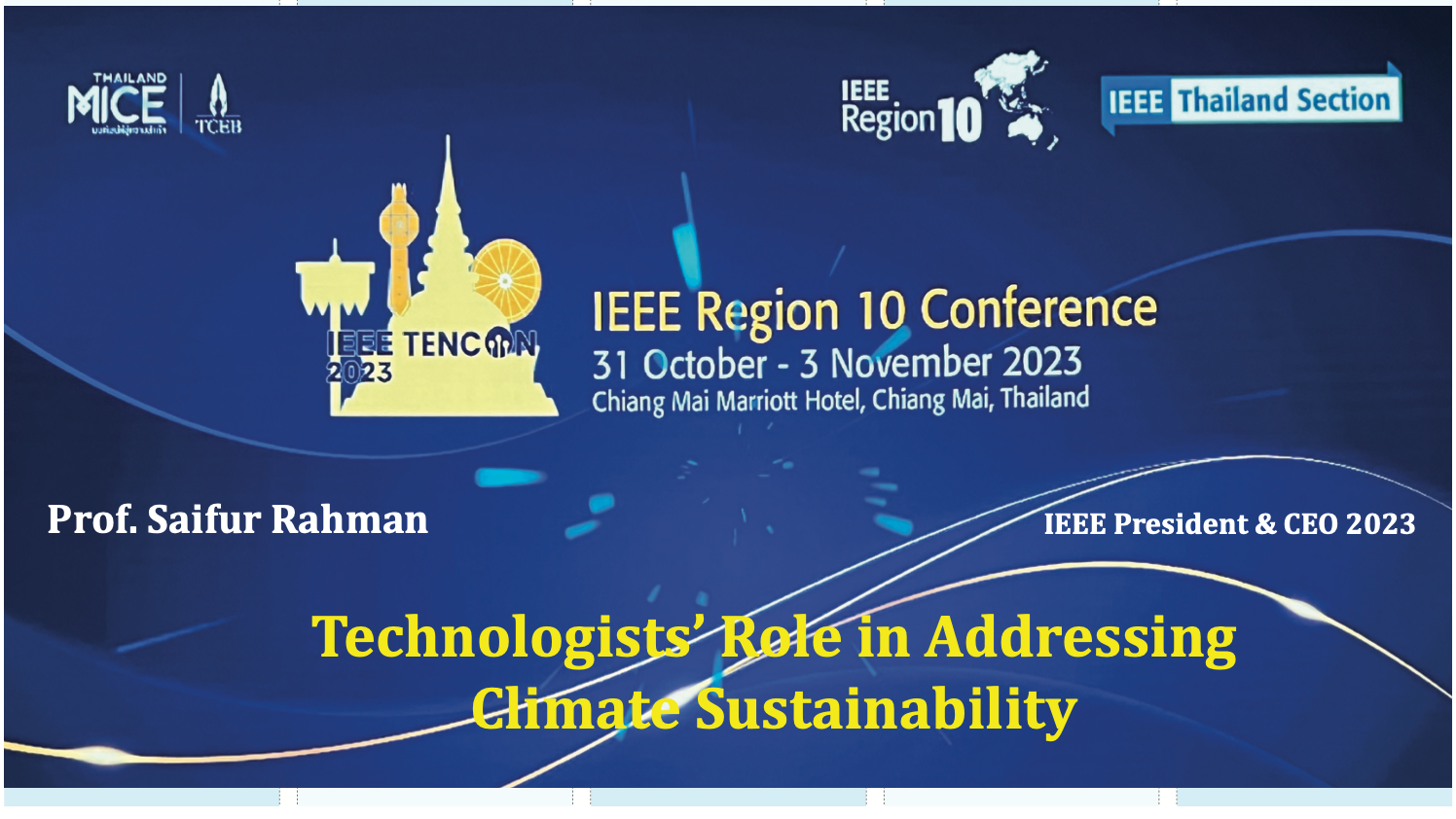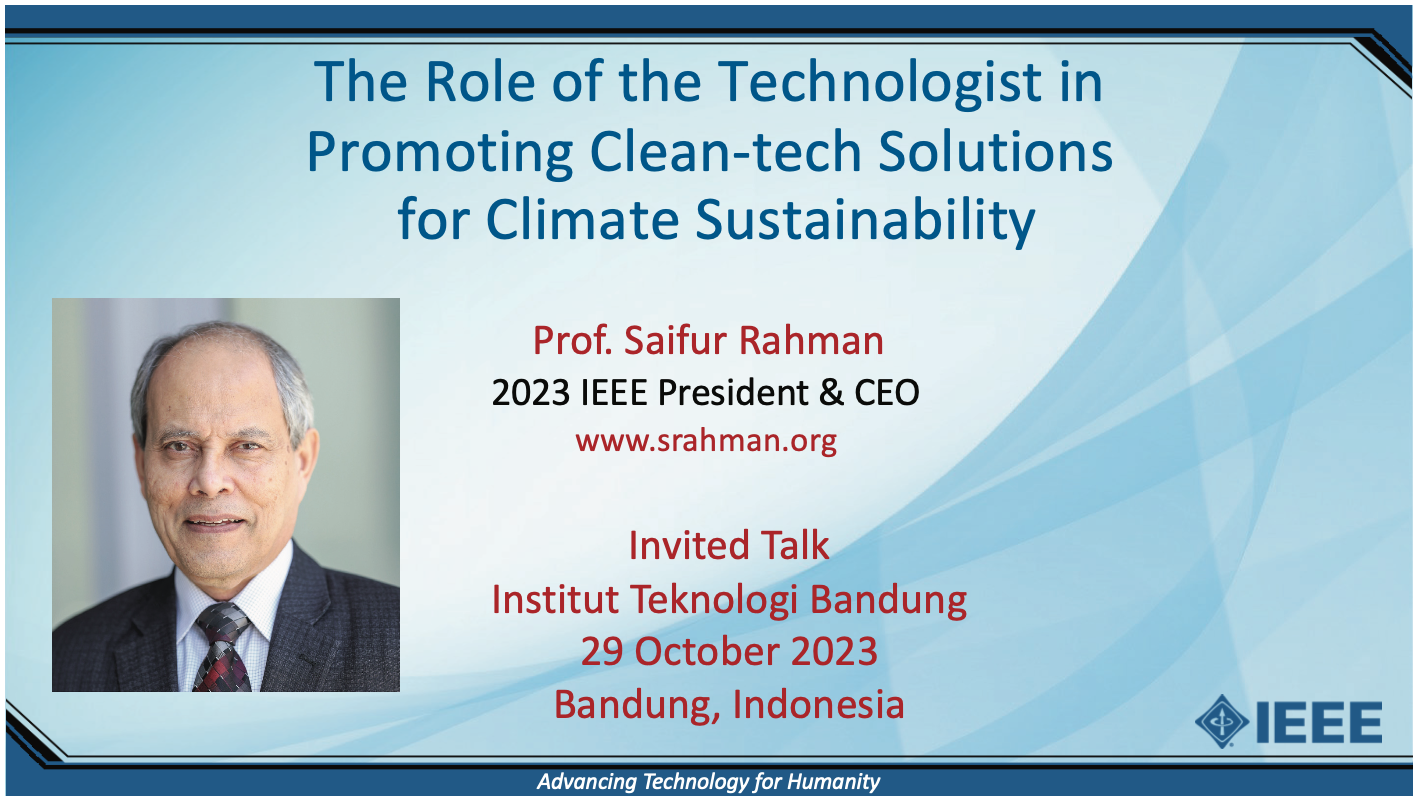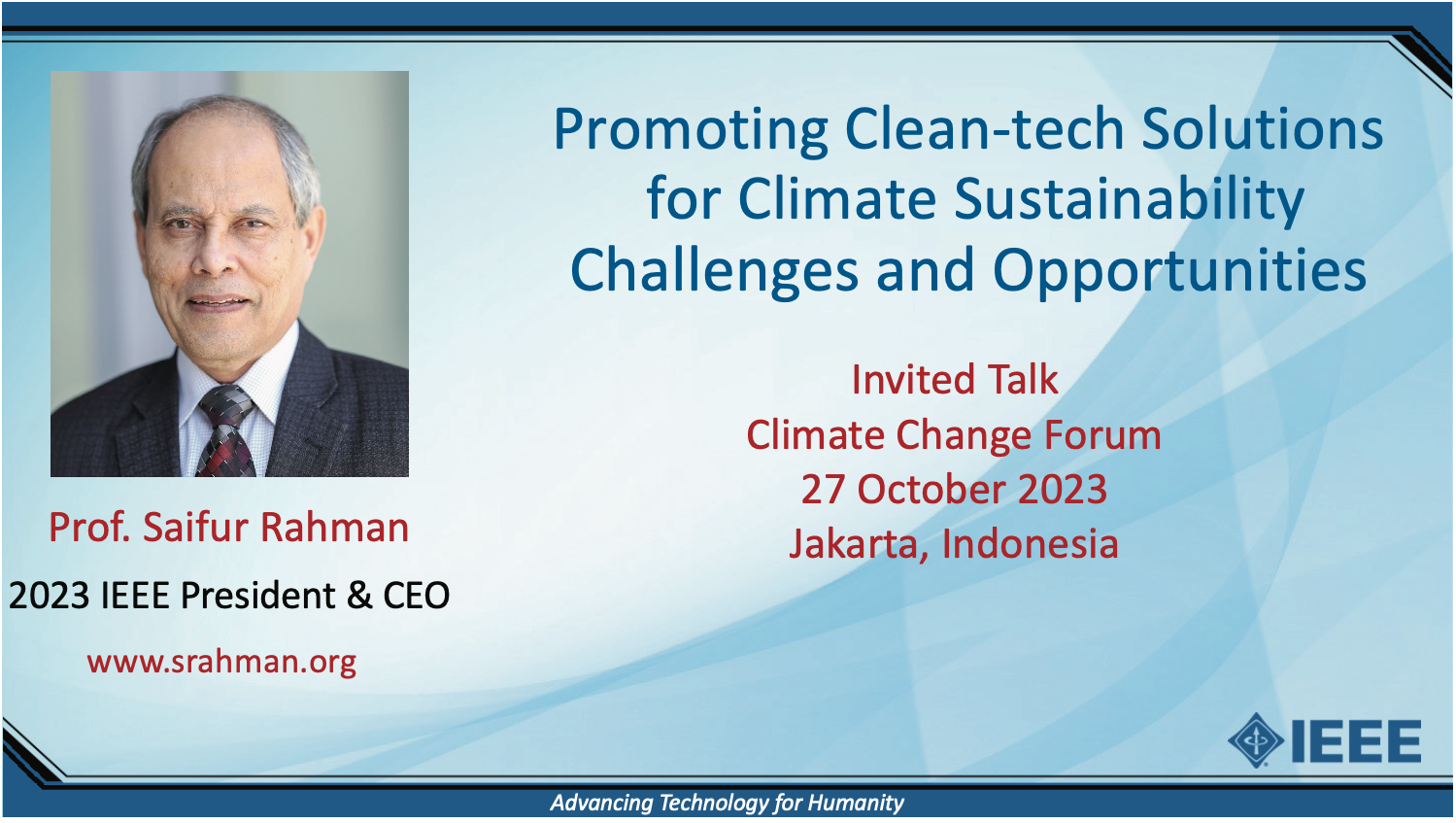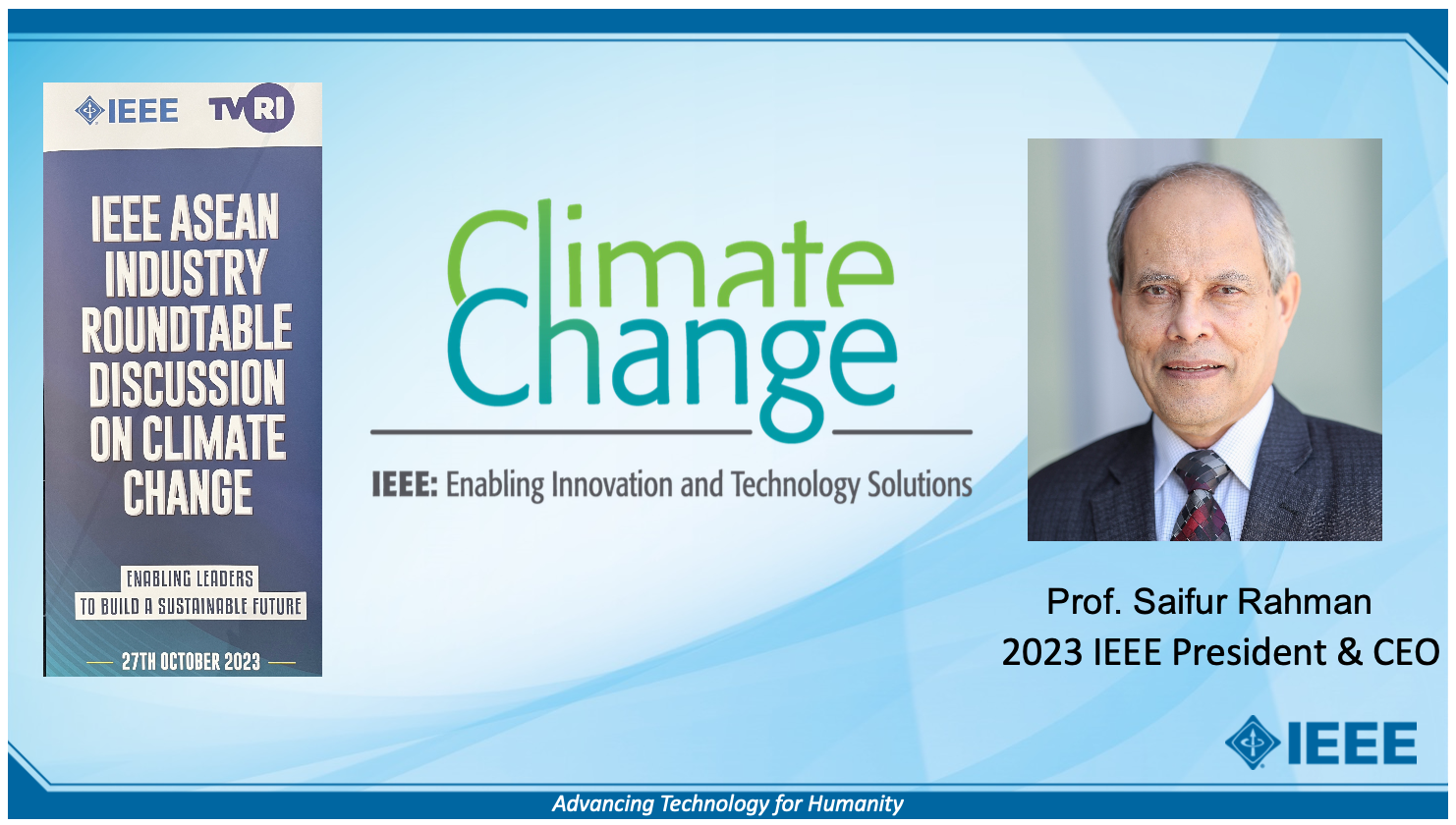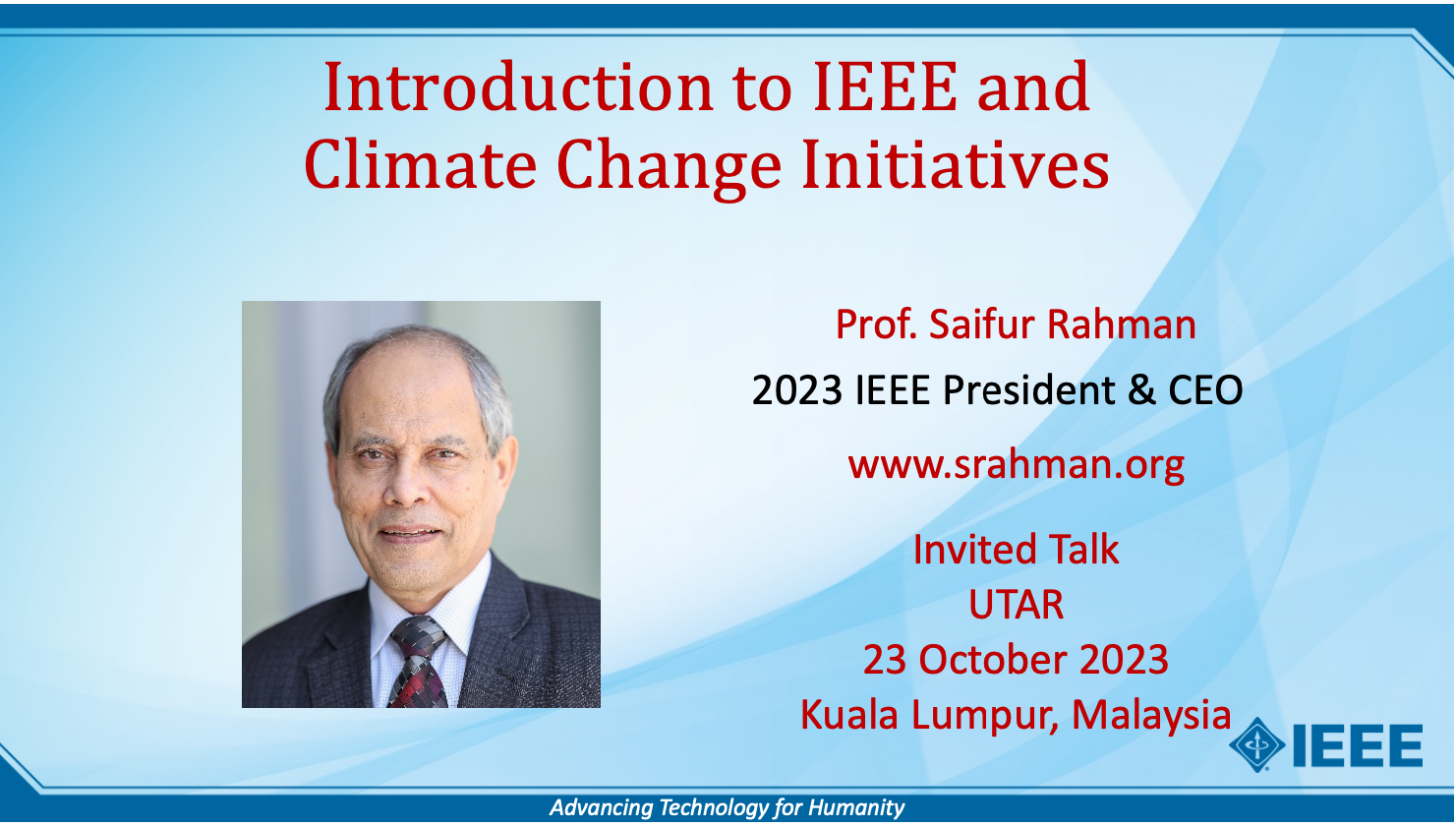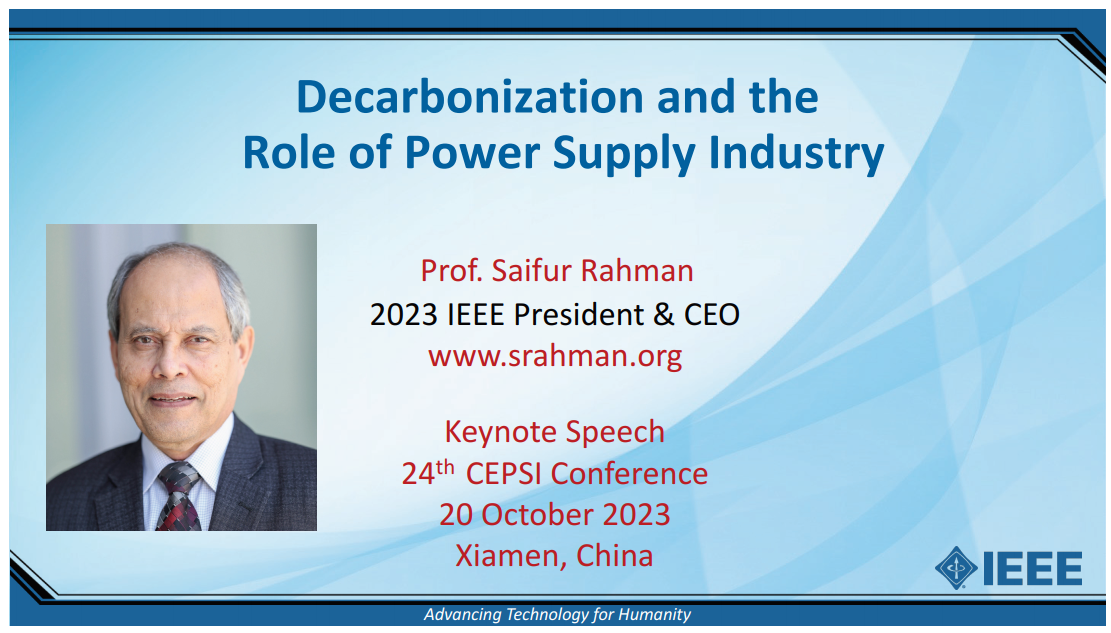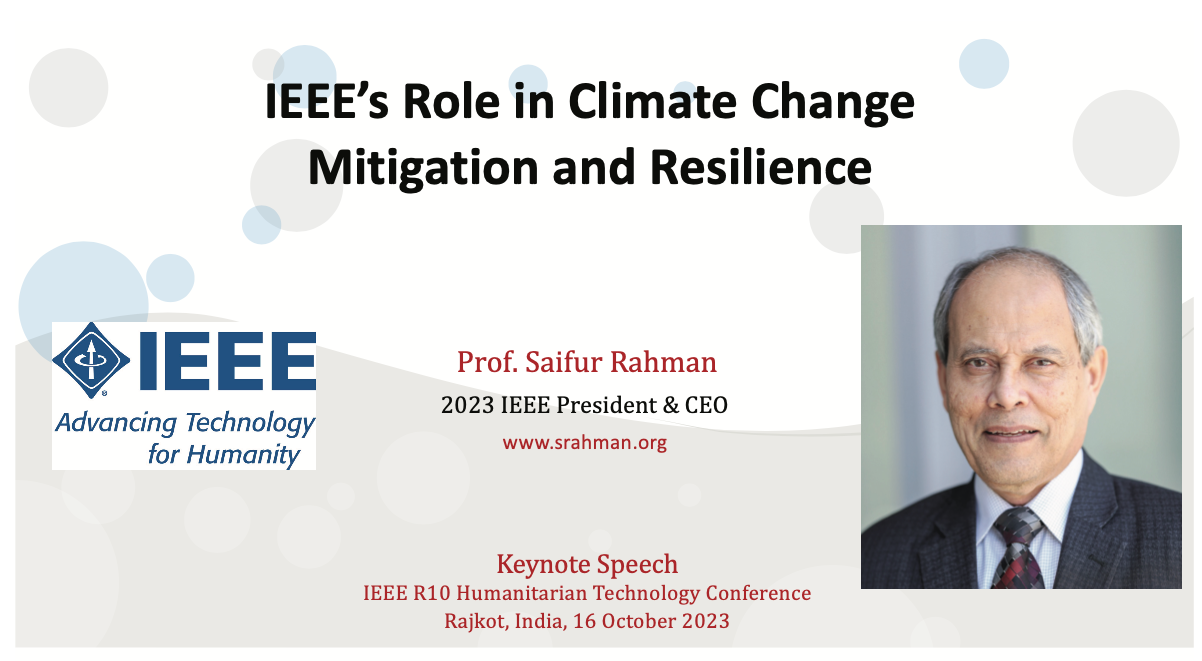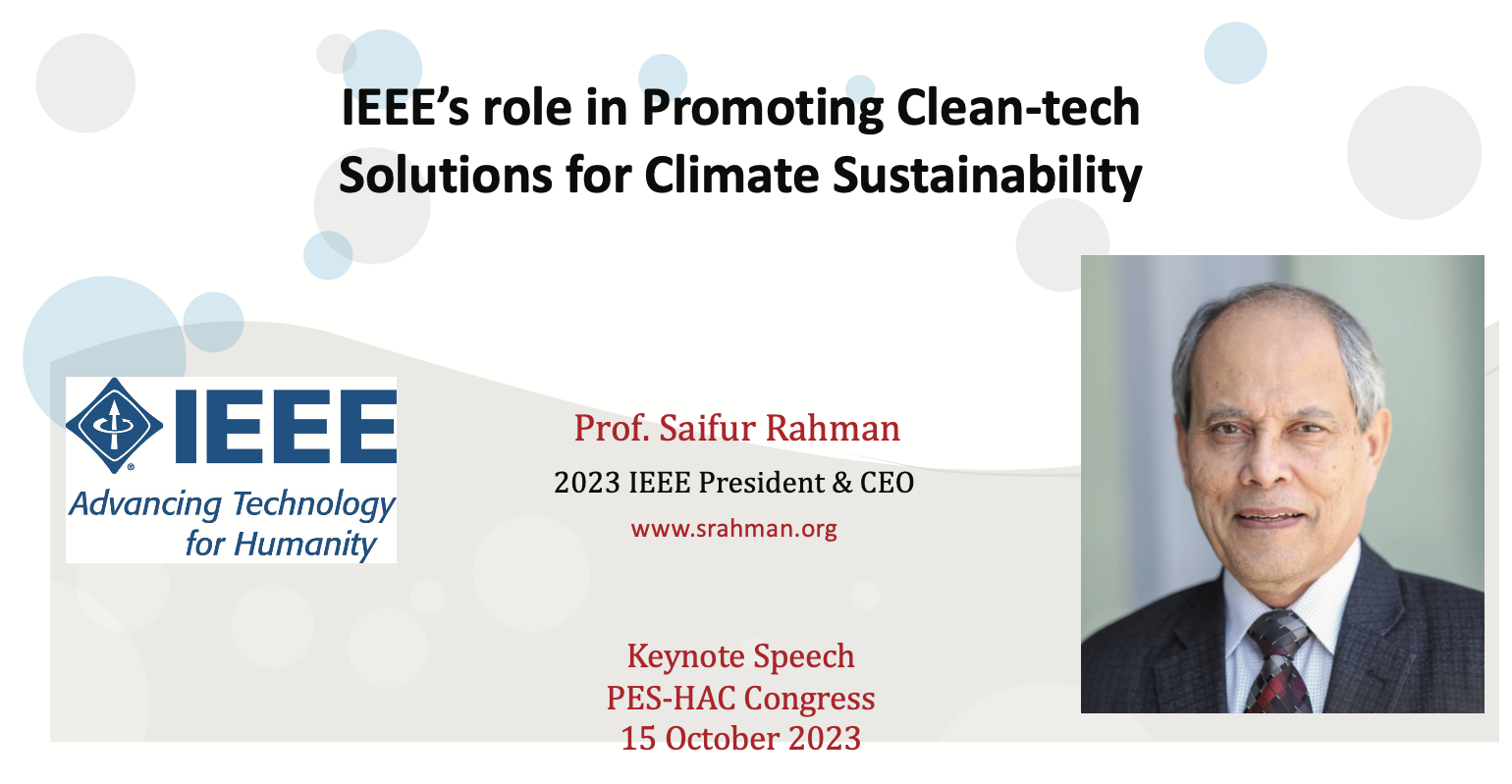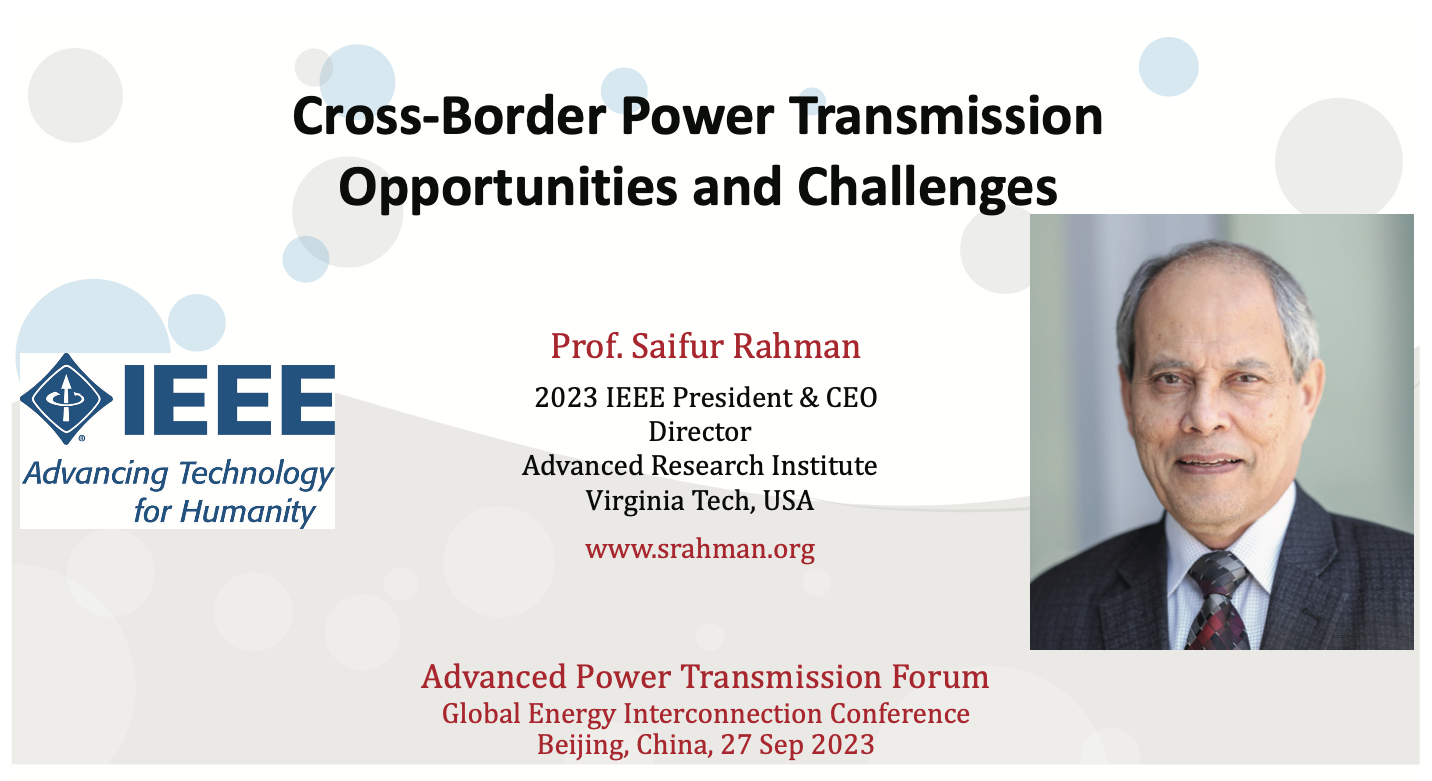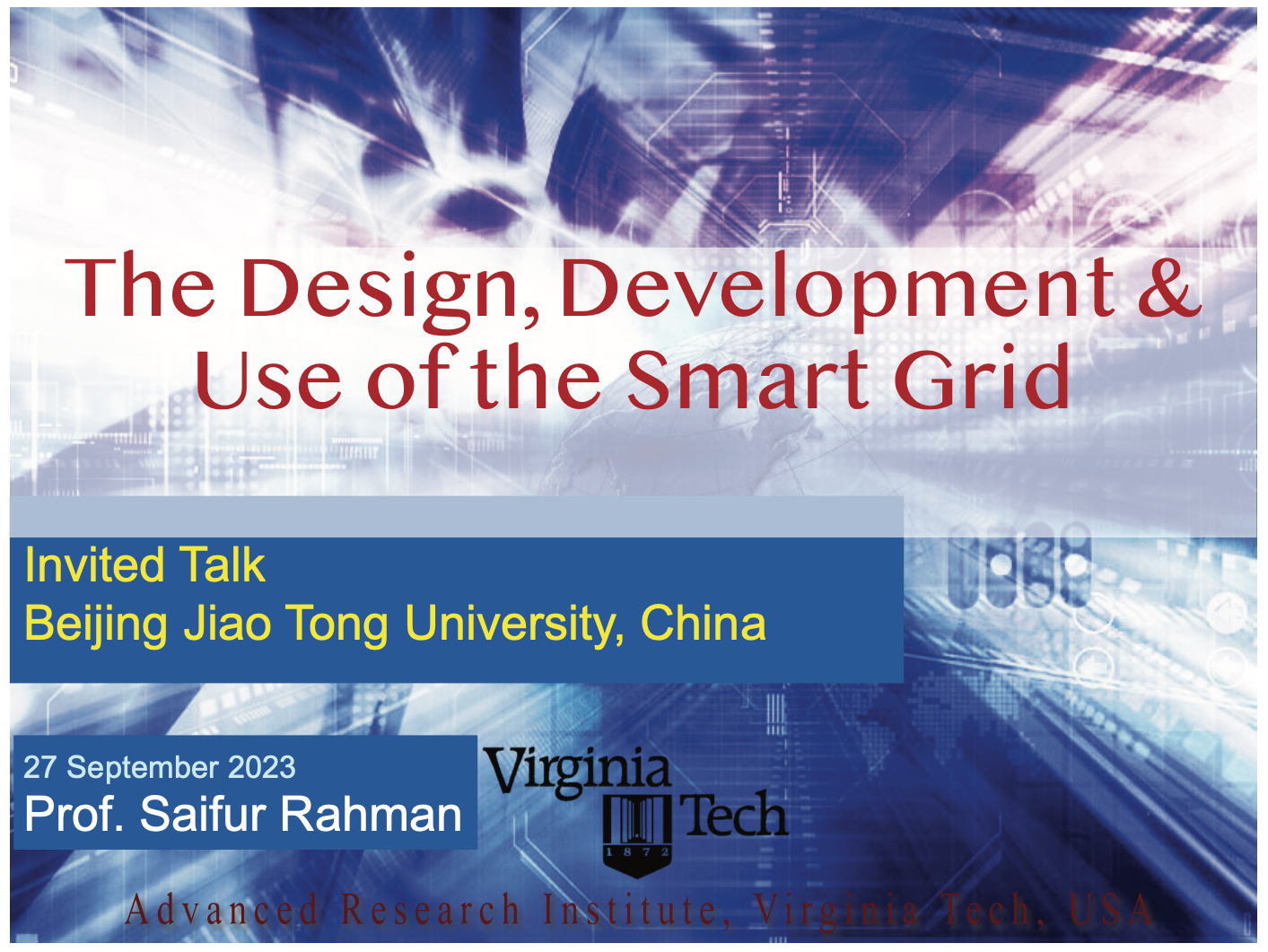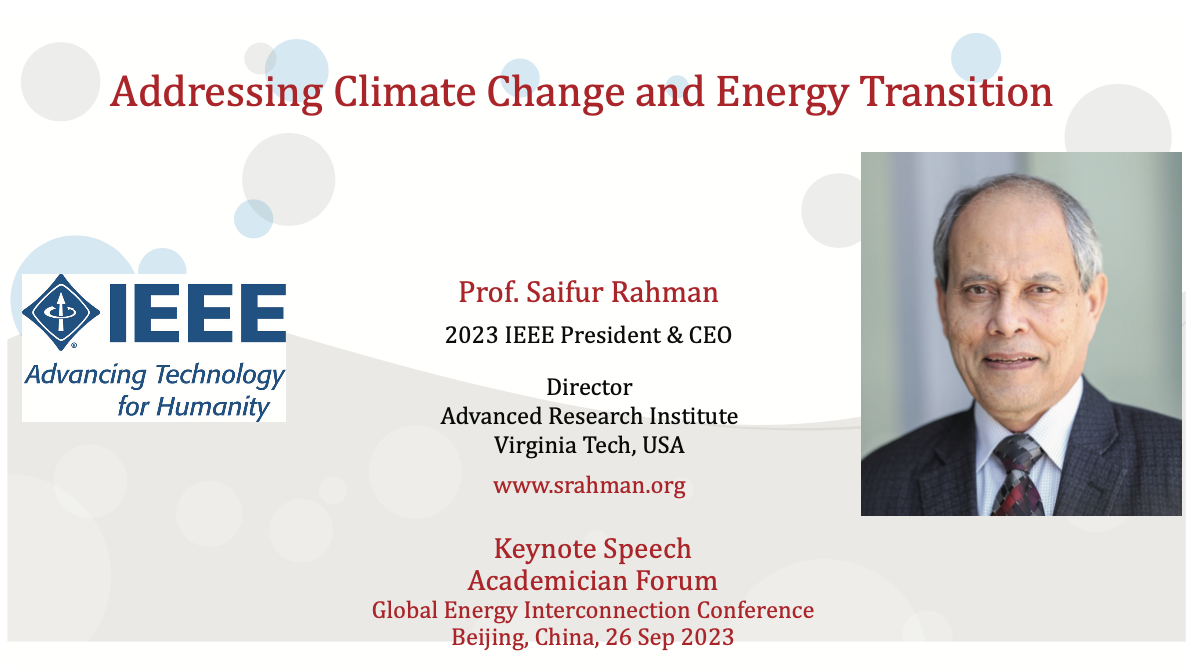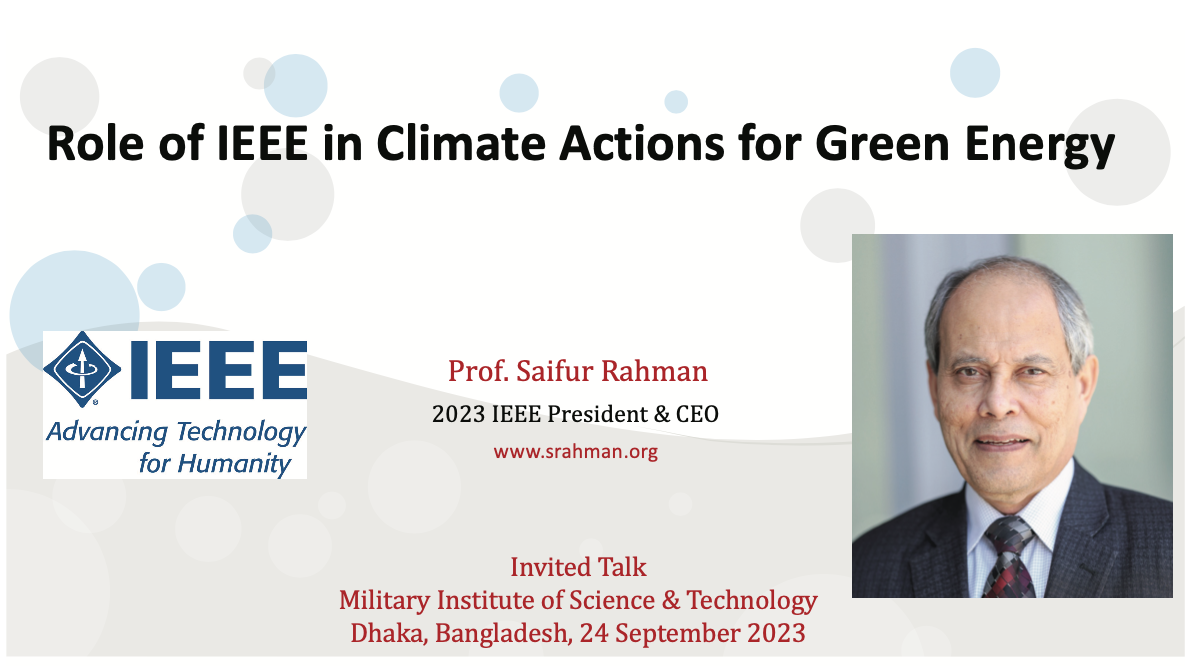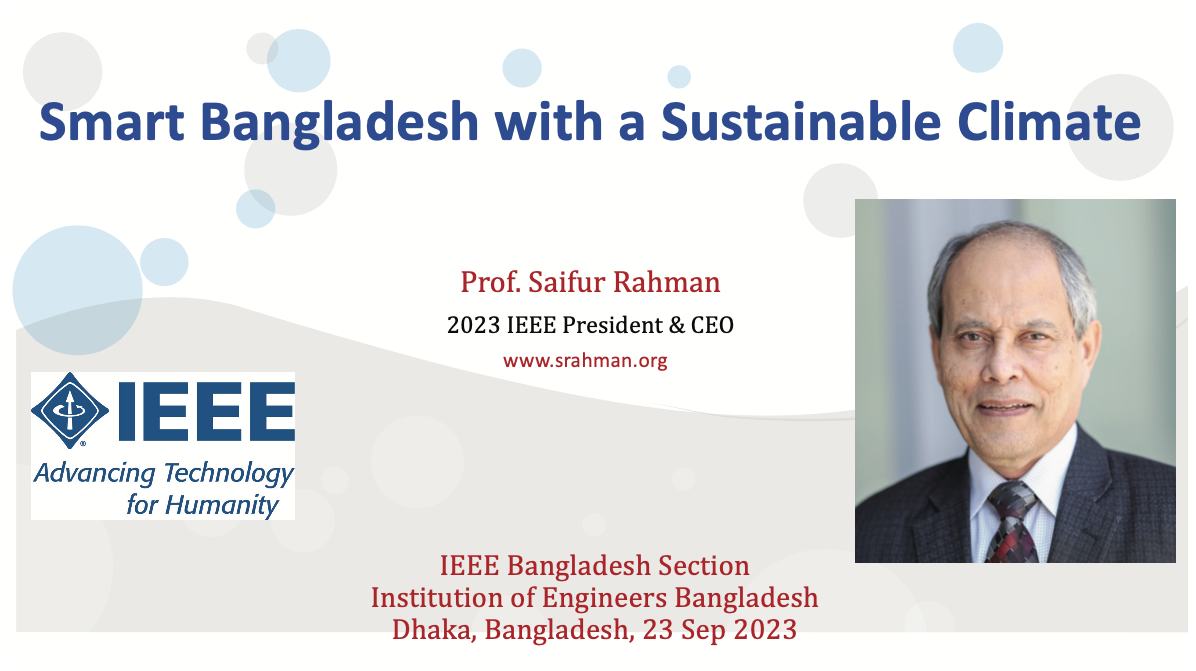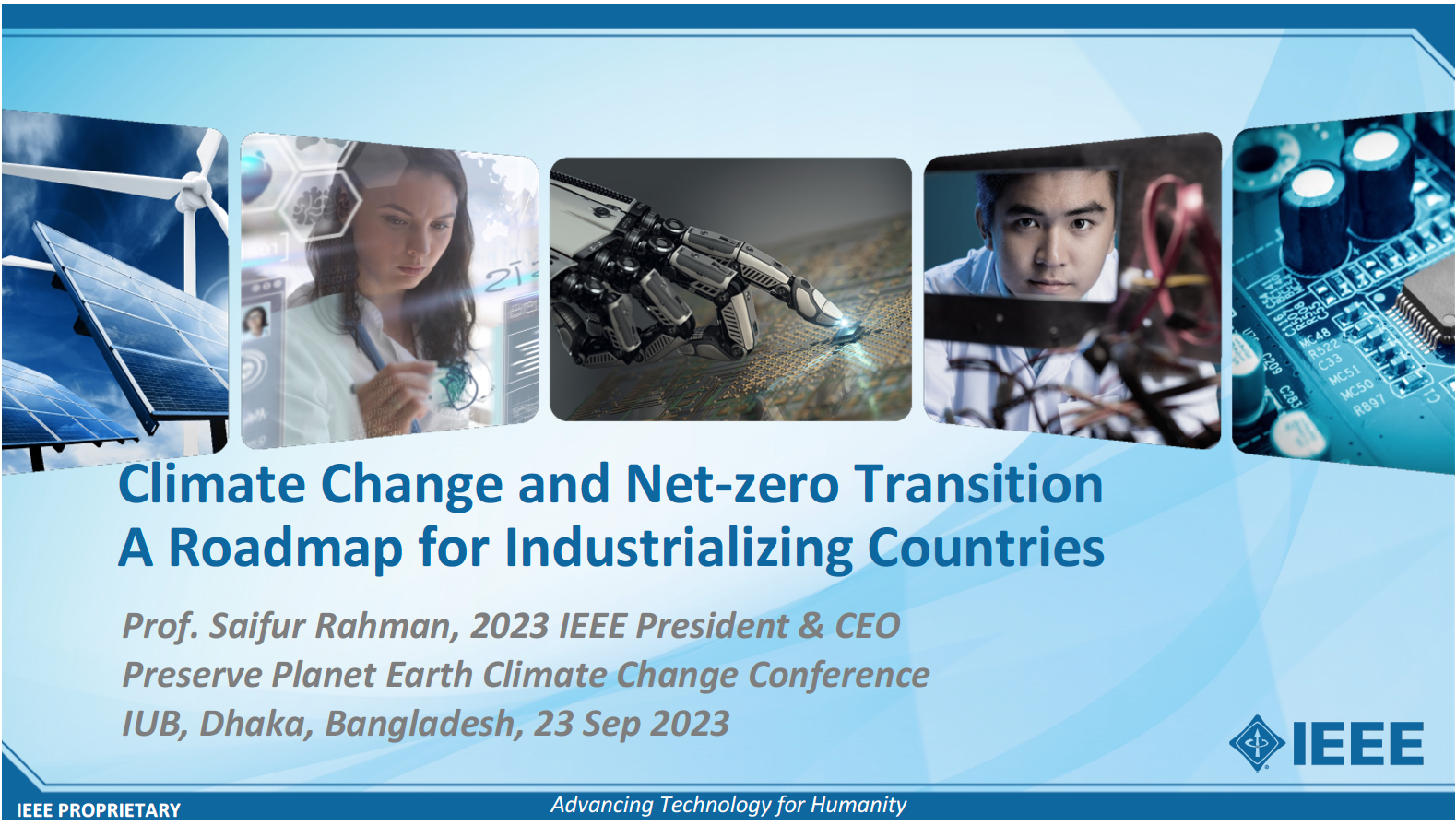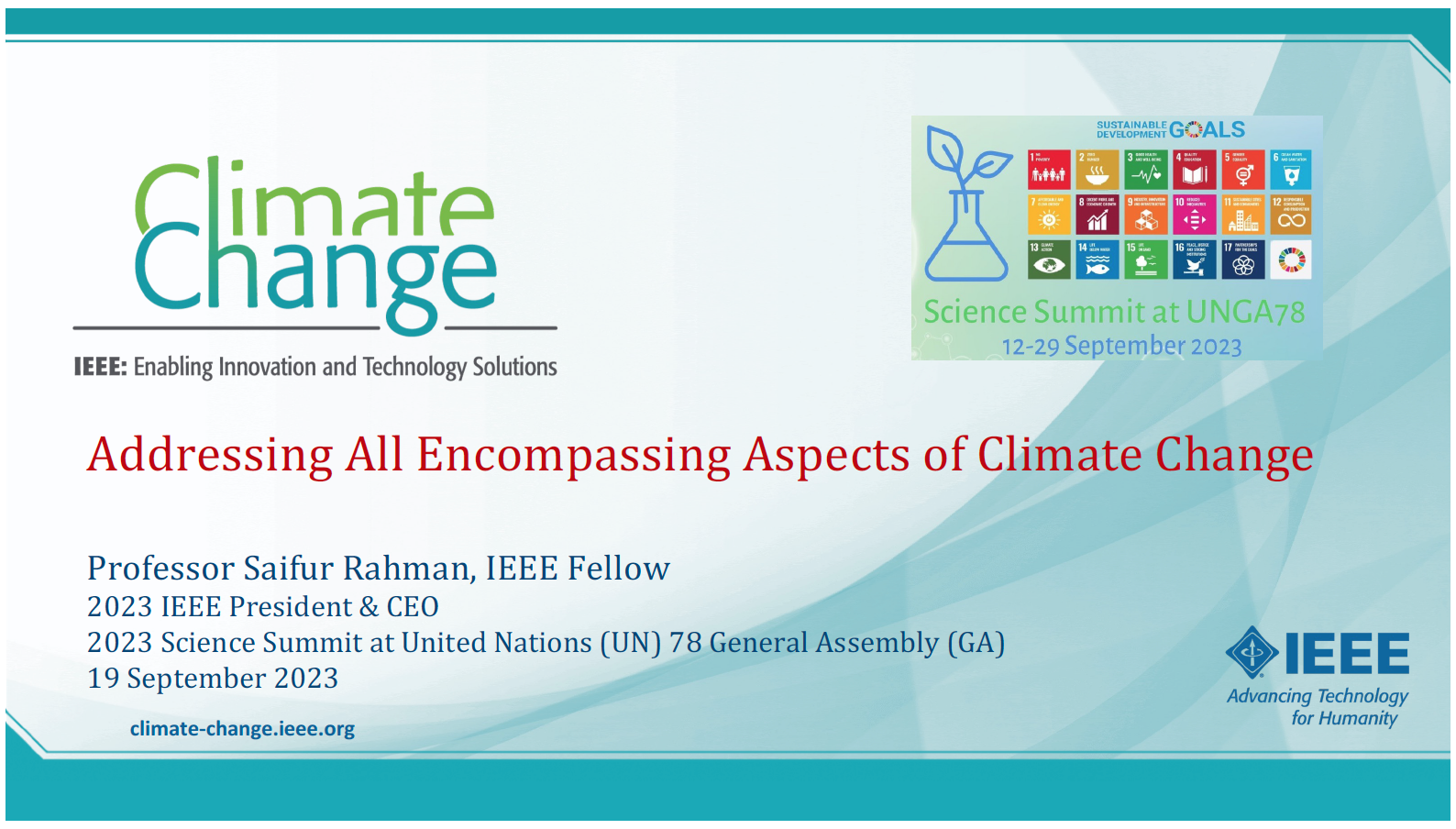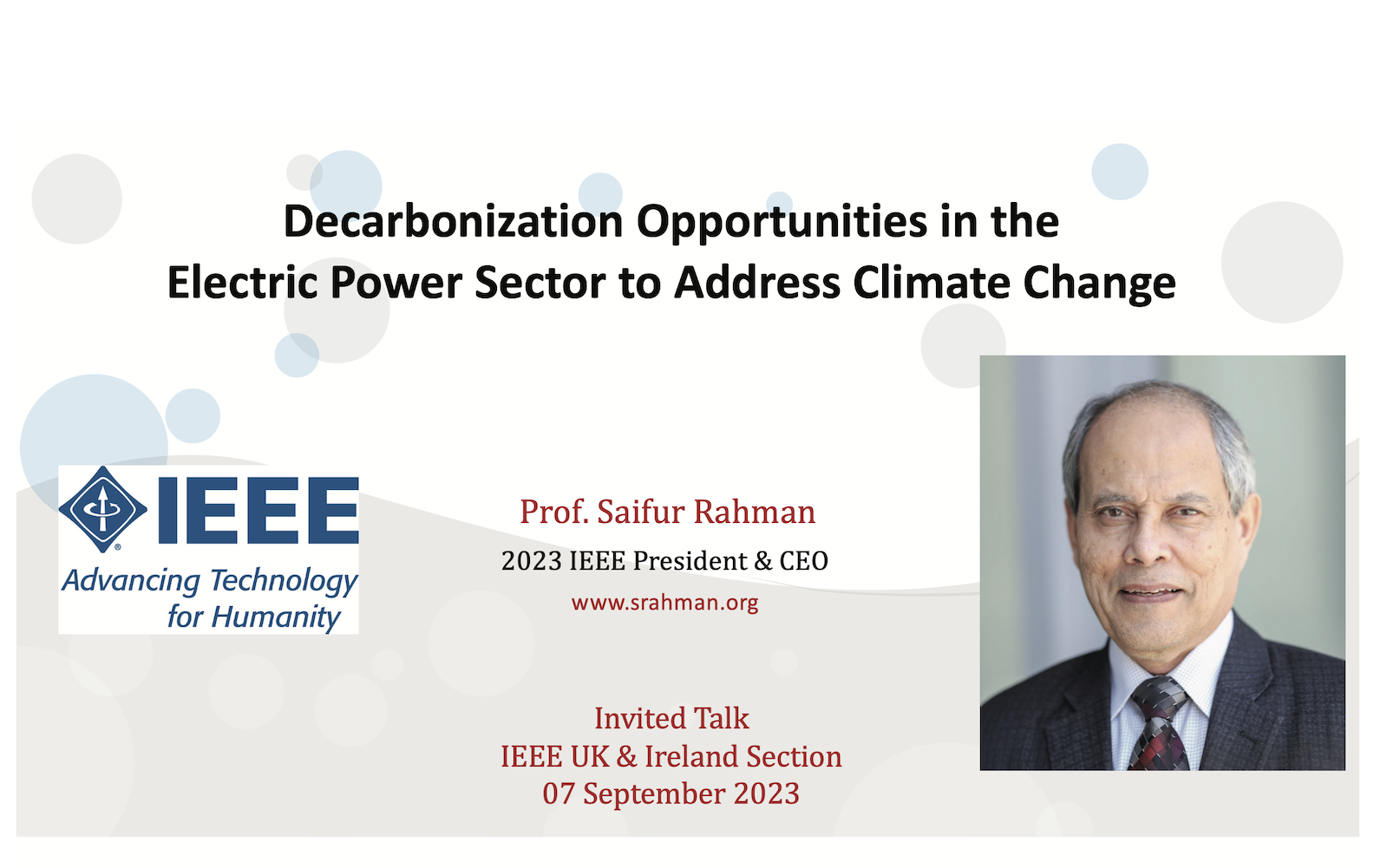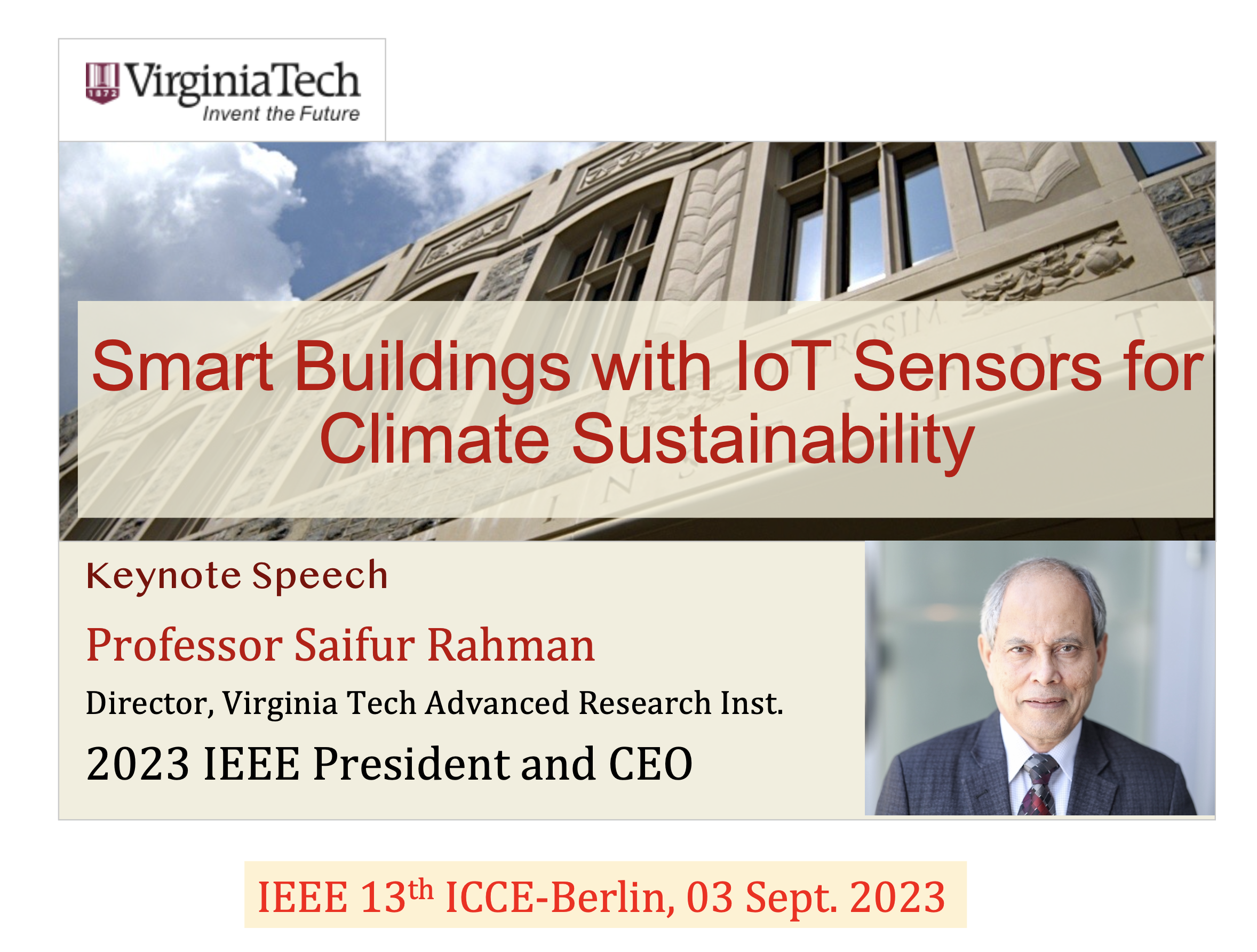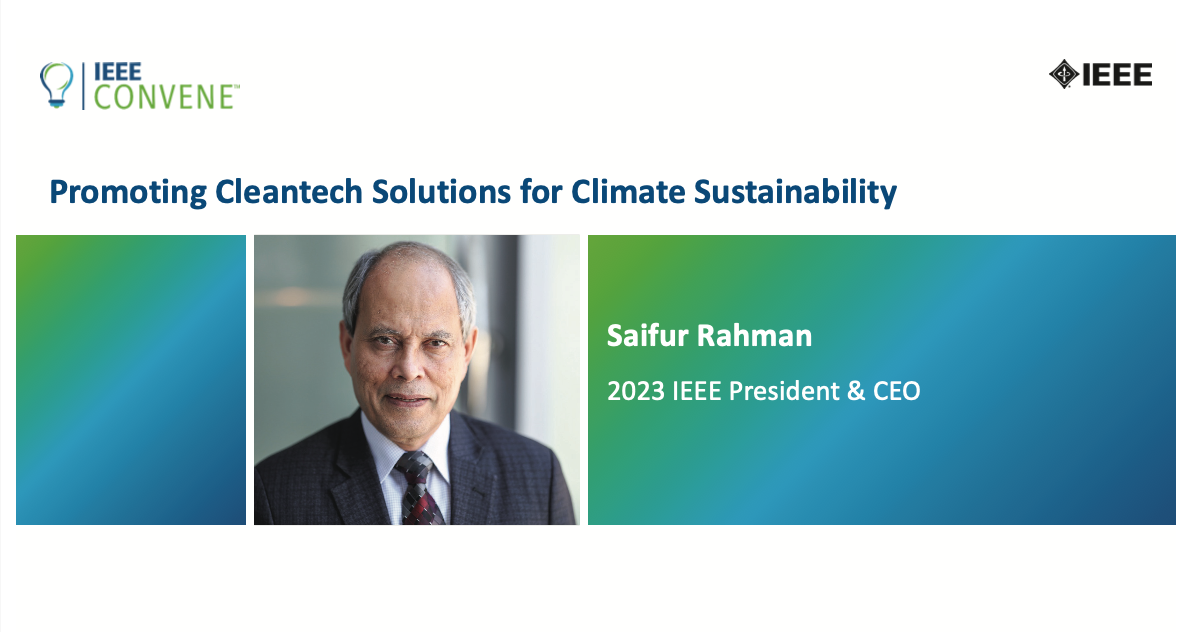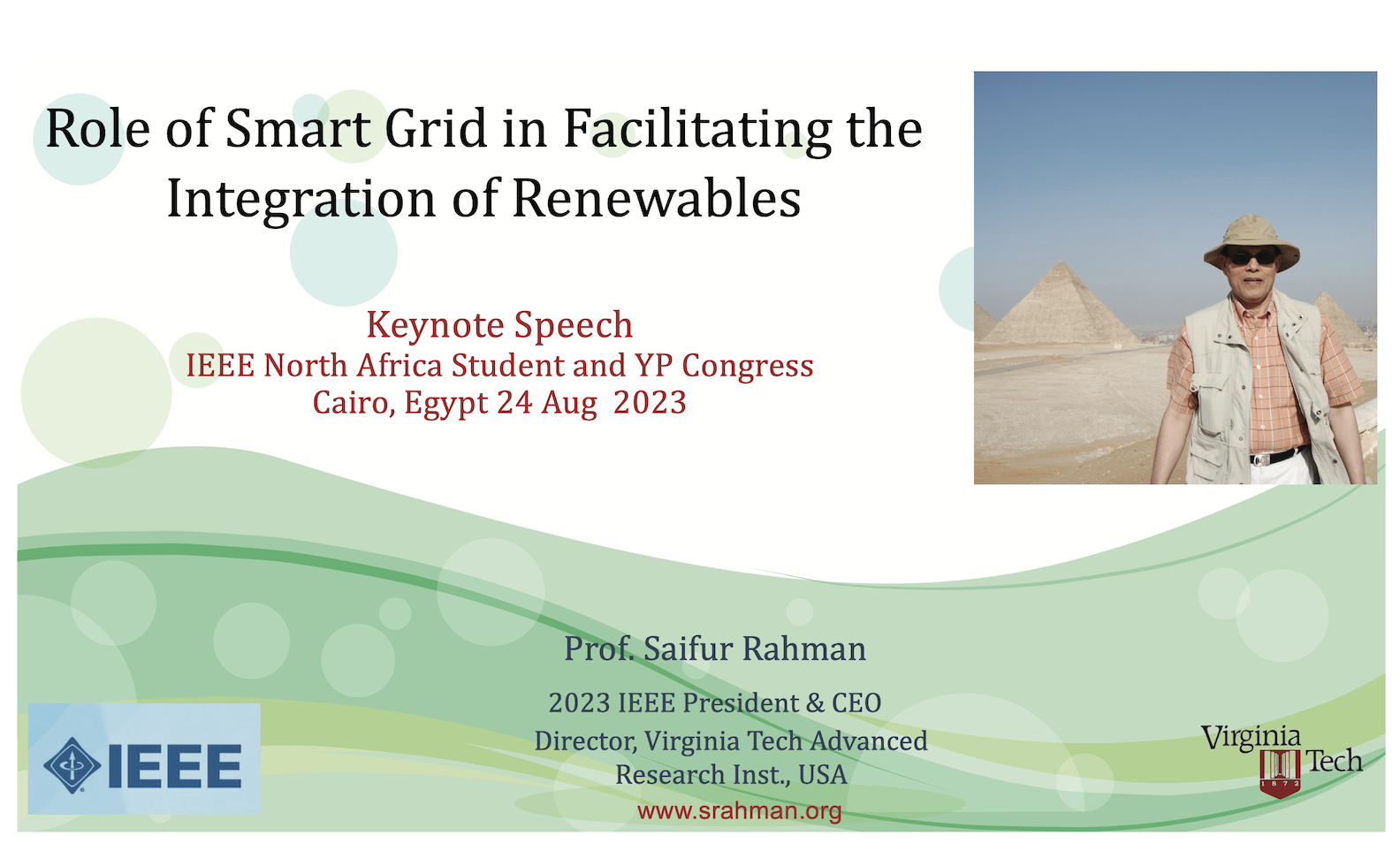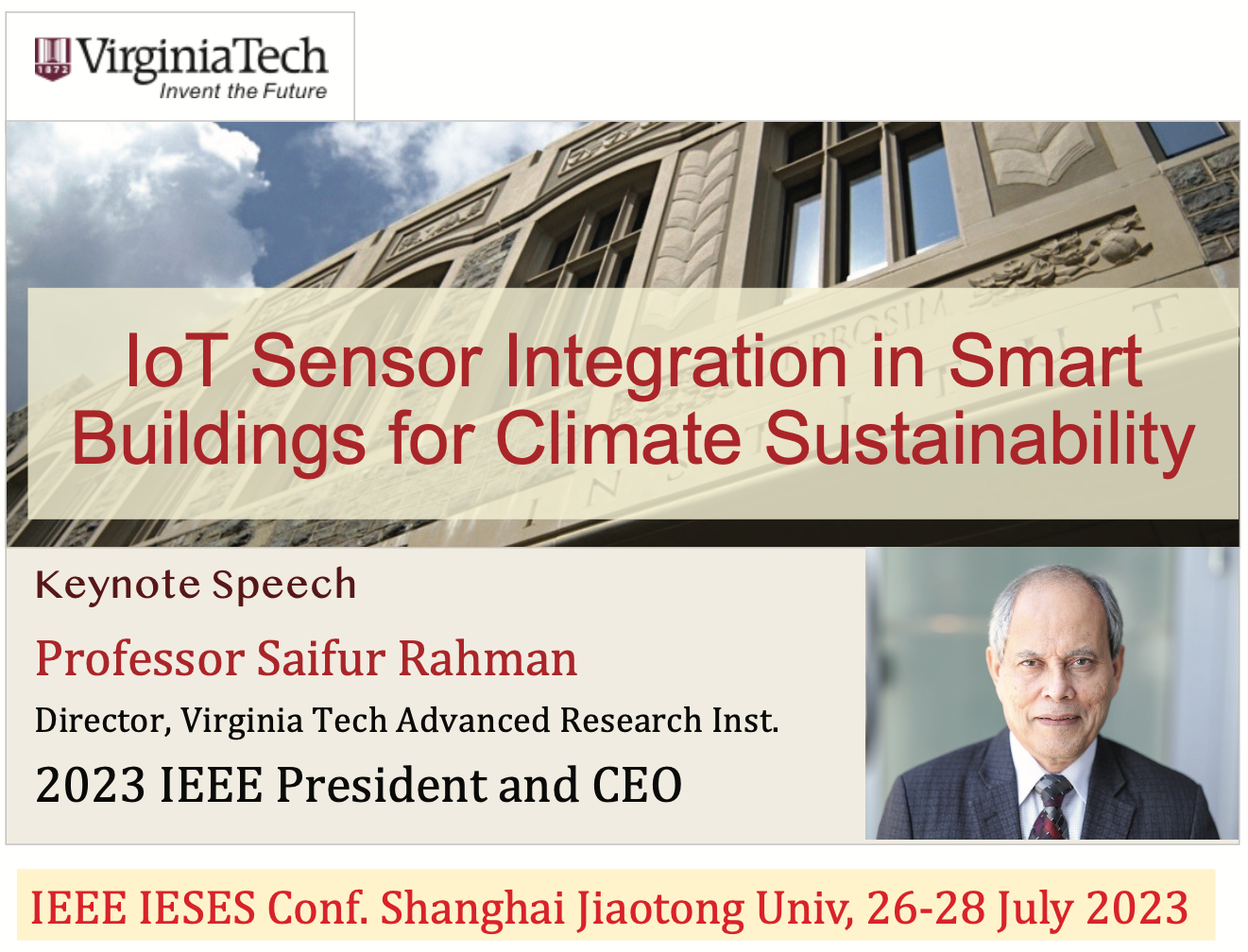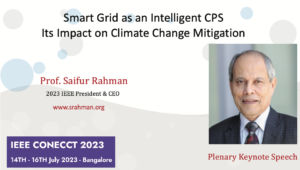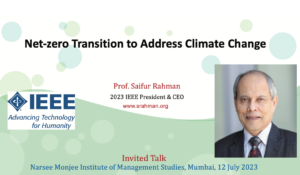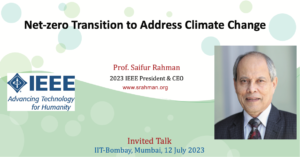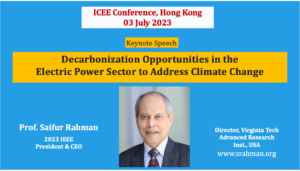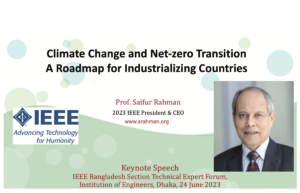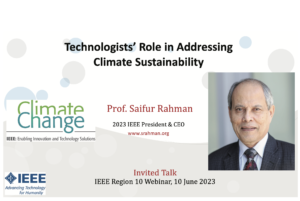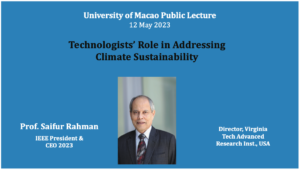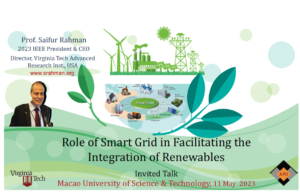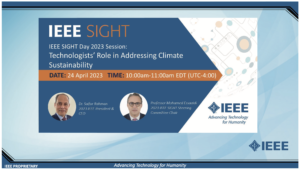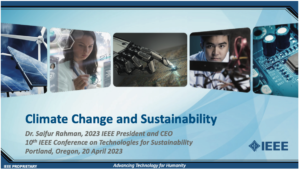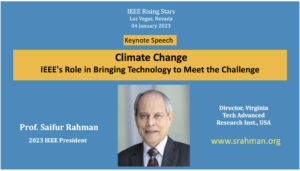18 December 2023
Riyadh, Saudi Arabia
Smart Grid as a Tool to Facilitate Climate Resilience
Invited talk, Saudi Arabia Smart Grid Conference, Riyadh, Saudi Arabia
This talk presents the smart gird ecosystem whose core is the Smart Building, many of which when combined forms a Smart Campus. A collection of smart campuses leads into a Smart City. A collection of interconnected smart cities forms a Smart Grid. A smart grid facilitates the integration of renewables into the grid by managing both supply and demand.
Innovative sensors and load control software platforms allow building loads to be adjusted to match short-term variations in supply from renewable energy sources. The IEEE program to promote clean-tech solutions for climate sustainability is discussed. Tools, technologies and best practices that can be used and followed to achieve climate sustainability are highlighted.
Saifur Rahman, PhD
Joseph Loring Professor & Director
Advanced Research Institute
Virginia Tech, USA
2023 IEEE President & CEO
16 December 2023
Tunisia
Role of the Smart Grid and Microgrid in Decarbonization
Keynote Speech, IREC, Tunisia
With the focus on environmental sustainability and energy security, power system planners are looking at renewable energy as agents of decarbonization to help with climate sustainability. But such generation sources have their own challenges – primarily intermittency. It is expected that the smart grid – due to its inherent communication, sensing and control capabilities – will have the ability to manage the load, storage and generation assets (including renewables) in the power grid to enable a large-scale integration of distributed generation.
In a smart grid, information about the state of the grid and its components can be exchanged quickly over long distances and complex networks. It will therefore be possible to have the integration of sustainable energy sources, such as wind, solar, off-shore electricity, etc. for smoother system operation. But, in order to build smart grids engineers will need to start with intelligent microgrids as building blocks. This lecture introduces the operational characteristics of renewable energy sources, storage devices, and various aspects of the smart grid. It also addresses the interplay among distributed generation, storage and conventional generation to provide an efficient operational strategy in the context of the smart grid.
Saifur Rahman, PhD
Joseph Loring Professor & Director
Advanced Research Institute
Virginia Tech, USA
2023 IEEE President & CEO
10 December 2023
Kerala, India
IEEE’s Role in Climate Change Mitigation & Resilience
Invited Talk, IEEE Kerala Section 40th Anniversary Celebration, Trivandrum, India
This lecture explains what is carbonization, addresses its causes and impacts. It then offers technological solutions to reduce CO2 emissions from the electric power sector which is responsible over 30% of global Carbon emissions. In order to address the reduction of carbon emissions from the electric power sector, a collaborative approach between the industrialized nation states and emerging economies is necessary. This will involve a portfolio of solutions with low-carbon generation from wind, solar, hydro and nuclear, storage, cross-border power transfer and advanced technology focusing on energy efficiency.
IEEE is playing a major role in this matter through it’s Climate Change Program. There are IEEE conferences and technical journals where numerous papers are presented and published which deal with climate change topics. IEEE is also working on international standards related to climate change. In addition, IEEE is collaborating with international organizations in the area of climate change mitigation. IEEE is participating in United Nations Conference on Climate
Change (COP) events, European Union energy related workshops and programs organized by the International Renewable Energy Agency (IRENA). More information about IEEE’s work in the field of climate change can be found from the dedicated website, climate-change.ieee.org.
Saifur Rahman, PhD
Joseph Loring Professor & Director
Advanced Research Institute
Virginia Tech, USA
2023 IEEE President & CEO
08 December 2023
Dubai, UAE
IEEE’s Role in Climate Change Mitigation & Resilience
Keynote Speech, IEEE Green-Tech, Sustainability & Net Zero Policies and Practices Symposium, Dubai, UAE
This lecture explains what is carbonization, addresses its causes and impacts. It then offers technological solutions to reduce CO2 emissions from the electric power sector which is responsible over 30% of global Carbon emissions. In order to address the reduction of carbon emissions from the electric power sector, a collaborative approach between the industrialized nation states and emerging economies is necessary. This will involve a portfolio of solutions with low-carbon generation from wind, solar, hydro and nuclear, storage, cross-border power transfer and advanced technology focusing on energy efficiency.
IEEE is playing a major role in this matter through it’s Climate Change Program. There are IEEE conferences and technical journals where numerous papers are presented and published which deal with climate change topics. IEEE is also working on international standards related to climate change. In addition, IEEE is collaborating with international organizations in the area of climate change mitigation. IEEE is participating in United Nations Conference on Climate Change (COP) events, European Union energy related workshops and programs organized by the International Renewable Energy Agency (IRENA). More information about IEEE’s work in the field of climate change can be found from the dedicated website, climate-change.ieee.org.
Saifur Rahman, PhD
Joseph Loring Professor & Director
Advanced Research Institute
Virginia Tech, USA
2023 IEEE President & CEO
05 December 2023
Dubai, UAE
Technology in the Electric Power Sector for Climate Change Mitigation
Invited Talk, Energy Transition Opportunities Session, Rotary International, Dubai, UAE
A rising level of greenhouse gas emissions, its effect on life and property, food production and human productivity on the planet are raising alarm bells in the civil society, among policy makers and industry leaders. At the same time, there is a lack of agreement between industrialized nations and emerging economies about the approach to global decarbonization efforts in the electric power, transportation, ICT, buildings, agriculture and the manufacturing sectors.
The presentation proposes a portfolio of solutions with low-carbon generation which can be equally attractive to both groups of the countries. It starts with the causes and effects of carbonization and mitigation opportunities. A major focus is placed on the CO2 produced through electricity production, as it is responsible for roughly a third of carbon emissions globally. The portfolio includes renewables, nuclear, carbon capture and sequestration, storage, cross-border electricity transfer and advanced technology focusing on energy efficiency. The presentation concludes with programs and activities within IEEE which helps to raise awareness about cleantech solutions to promote climate sustainability through conferences, publications and social media.
Saifur Rahman, PhD
Joseph Loring Professor & Director
Advanced Research Institute
Virginia Tech, USA
2023 IEEE President & CEO
03 December 2023
Dubai, UAE
Promoting Clean-Tech Solutions for Climate Sustainability
Invited Talk, CleanTech Connect Program, Dubai Electricity & Water Authority
A rising level of greenhouse gas emissions, its effect on life and property, food production and human productivity on the planet are raising alarm bells in the civil society, among policy makers and industry leaders. At the same time, there is a lack of agreement between industrialized nations and emerging economies about the approach to global decarbonization efforts in the electric power, transportation, ICT, buildings, agriculture and the manufacturing sectors.
The presentation proposes a portfolio of solutions with low-carbon generation which can be equally attractive to both groups of the countries. It starts with the causes and effects of carbonization and mitigation opportunities. A major focus is placed on the CO2 produced through electricity production, as it is responsible for roughly a third of carbon emissions globally. The portfolio includes renewables, nuclear, carbon capture and sequestration, storage, cross-border electricity transfer and advanced technology focusing on energy efficiency. The presentation concludes with programs and activities within IEEE which helps to raise awareness about cleantech solutions to promote climate sustainability through conferences, publications and social media.
Saifur Rahman, PhD
Joseph Loring Professor & Director
Advanced Research Institute
Virginia Tech, USA
2023 IEEE President & CEO
29 November 2023
Abu Dhabi, UAE
Energy Transition with Cross-Border Power Transfer
Invited Talk, EEI-GCCIA COP28 Transmission Summit, Abu Dhabi, UAE
Cross-border power transmission provides the opportunity to move low-carbon electricity from high supply area to areas where electricity production is limited, or it is carbon-intensive. This presentation highlights the opportunities and challenges in cross-border power transfer.
Some case-specific examples form North America, Europe, Middle-East, Africa and Asia are provided. Challenges arise from geopolitics, national security concerns, funding availability, technology readiness and institutional barriers. Here are some suggested actions electric utility planners may consider to promote cross-border power transfer.
• Build a platform for information exchange
• Identify benefits and risks
• Expand cross-border infrastructure
• Develop a wheeling price model
• Complement national regulation by regional coordination
• Remain cost conscious to maintain political support
Saifur Rahman, PhD
Joseph Loring Professor & Director
Advanced Research Institute
Virginia Tech, USA
2023 IEEE President & CEO
21 November 2023
Online IEEE Forum
Meet the 2023 IEEE President & CEO
Invited Talk, Online Forum on IEEE VOLT
The 2023 IEEE President is introduced to the members of the IEEE Volunteers in Training Forum as a part of the President’s outreach to IEEE volunteers globally. The talk focuses on the activities of the organization followed by its climate change program.
The presentation highlights the programs and activities within IEEE which helps to raise awareness about cleantech solutions to promote climate sustainability through conferences, publications and social media. It also points out how VOLT volunteers can engage with IEEE’s flagship program on Climate Sustainability solutions.
Saifur Rahman, PhD
Joseph Loring Professor & Director
Advanced Research Institute
Virginia Tech, USA
2023 IEEE President & CEO
13 November 2023
Baltimore, USA
Advancing Climate Sustainability Solutions and The Role of IEEE
Keynote Speech, IEEE Future Networks World Forum, Baltimore, Maryland, USA
A rising level of greenhouse gas emissions, its effect on life and property, food production and human productivity on the planet are raising alarm bells in the civil society, among policy makers and industry leaders. At the same time, there is a lack of agreement between industrialized nations and emerging economies about the approach to global decarbonization efforts in the electric power, transportation, ICT, buildings, agriculture and the manufacturing sectors.
The presentation proposes a portfolio of solutions with low-carbon generation which can be equally attractive to both groups of the countries. It starts with the causes and effects of carbonization and mitigation opportunities. A major focus is placed on the CO2 produced through electricity production, as it is responsible for roughly a third of carbon emissions globally. The portfolio includes renewables, nuclear, carbon capture and sequestration, storage, cross-border electricity transfer and advanced technology focusing on energy efficiency. The presentation concludes with programs and activities within IEEE which helps to raise awareness about cleantech solutions to promote climate sustainability through conferences, publications and social media.
Saifur Rahman, PhD
Joseph Loring Professor & Director
Advanced Research Institute
Virginia Tech, USA
2023 IEEE President & CEO
06 November 2023
Shenzhen, China
Role of IEEE Standards and Awareness Building in Climate Change Mitigation
IEEE SA 50th Anniversary Event, Shenzhen, China
As the world’s largest organization of technical professionals, IEEE has both the opportunity and the responsibility to assist in organizing the response of engineers, scientists, and technical professionals to address the causes, mitigate the impact, and adapt to climate change. IEEE has significant ongoing, relevant efforts and expertise that can be brought to bear on this issue. Standards is one of the five core areas of focus for IEEE.
As IEEE promotes clean-tech solutions for climate sustainability, standards are essential to make these solutions globally deployable. There is now a global consensus that decarbonization efforts in the electric power, transportation, ICT, buildings, agriculture and the manufacturing sectors are essential to maintain climate sustainability. IEEE has many established and under-development standards which can play a substantial role in the global acceptability of the technology solutions being proposed. There will be a need for continued collaborative efforts between IEEE and other standards development organizations to bring these standards to the attention of technologists who are working in the area of climate change mitigation. The IEEE’s climate change program and the associated promotional activities can provide the forum for such outreach.
Saifur Rahman, PhD
Joseph Loring Professor & Director
Advanced Research Institute
Virginia Tech, USA
2023 IEEE President & CEO
02 November 2023
Chiang Mai, Thailand
Introduction to IEEE and Climate Change Initiatives
Invited Talk, CMU Executive Forum, Chiang Mai, Thailand
A rising level of greenhouse gas emissions, its effect on life and property, food production and human productivity on the planet are raising alarm bells in the civil society, among policy makers and industry leaders. At the same time, there is a lack of agreement between industrialized nations and emerging economies about the approach to global decarbonization efforts in the electric power, transportation, ICT, buildings, agriculture and the manufacturing sectors.
The presentation proposes a portfolio of solutions with low-carbon generation which can be equally attractive to both groups of the countries. It starts with the causes and effects of carbonization and mitigation opportunities. A major focus is placed on the CO2 produced through electricity production, as it is responsible for roughly a third of carbon emissions globally. The portfolio includes renewables, nuclear, carbon capture and sequestration, storage, cross-border electricity transfer and advanced technology focusing on energy efficiency. The presentation concludes with programs and activities within IEEE which helps to raise awareness about cleantech solutions to promote climate sustainability through conferences, publications and social media.
Saifur Rahman, PhD
Joseph Loring Professor & Director
Advanced Research Institute
Virginia Tech, USA
2023 IEEE President & CEO
31 October 2023
Chiang Mai, Thailand
Technologist’s Role in Addressing Climate Sustainability
Keynote Speech, IEEE TENCON 2023 Conference, Chiang Mai, Thailand
A rising level of greenhouse gas emissions, its effect on life and property, food production and human productivity on the planet are raising alarm bells in the civil society, among policy makers and industry leaders. At the same time, there is a lack of agreement between industrialized nations and emerging economies about the approach to global decarbonization efforts in the electric power, transportation, ICT, buildings, agriculture and the manufacturing sectors.
The presentation proposes a portfolio of solutions with low-carbon generation which can be equally attractive to both groups of the countries. It starts with the causes and effects of carbonization and mitigation opportunities. A major focus is placed on the CO2 produced through electricity production, as it is responsible for roughly a third of carbon emissions globally. The portfolio includes renewables, nuclear, carbon capture and sequestration, storage, cross-border electricity transfer and advanced technology focusing on energy efficiency. The presentation concludes with programs and activities within IEEE which helps to raise awareness about cleantech solutions to promote climate sustainability through conferences, publications and social media.
Saifur Rahman, PhD
Joseph Loring Professor & Director
Advanced Research Institute
Virginia Tech, USA
2023 IEEE President & CEO
29 October 2023
Bandung, Indonesia
The Role of the Technologist in Promoting Clean-tech Solutions for Climate Sustainability
Invited Talk, Institute of Technology Bandung, Bandung, Indonesia
A rising level of greenhouse gas emissions, its effect on life and property, food production and human productivity on the planet are raising alarm bells in the civil society, among policy makers and industry leaders. At the same time, there is a lack of agreement between industrialized nations and emerging economies about the approach to global decarbonization efforts in the electric power, transportation, ICT, buildings, agriculture and the manufacturing sectors.
The presentation proposes a portfolio of solutions with low-carbon generation which can be equally attractive to both groups of the countries. It starts with the causes and effects of carbonization and mitigation opportunities. A major focus is placed on the CO2 produced through electricity production, as it is responsible for roughly a third of carbon emissions globally. The portfolio includes renewables, nuclear, carbon capture and sequestration, storage, cross-border electricity transfer and advanced technology focusing on energy efficiency. The presentation concludes with programs and activities within IEEE which helps to raise awareness about cleantech solutions to promote climate sustainability through conferences, publications and social media.
Saifur Rahman, PhD
Joseph Loring Professor & Director
Advanced Research Institute
Virginia Tech, USA
2023 IEEE President & CEO
27 October 2023
Jakarta, Indonesia
Promoting Clean-tech Solutions for Climate Sustainability Challenges and Opportunities
Invited Talk, Jakarta Forum, Indonesia
A rising level of greenhouse gas emissions, its effect on life and property, food production and human productivity on the planet are raising alarm bells in the civil society, among policy makers and industry leaders. At the same time, there is a lack of agreement between industrialized nations and emerging economies about the approach to global decarbonization efforts in the electric power, transportation, ICT, buildings, agriculture and the manufacturing sectors.
The presentation proposes a portfolio of solutions with low-carbon generation which can be equally attractive to both groups of the countries. It starts with the causes and effects of carbonization and mitigation opportunities. A major focus is placed on the CO2 produced through electricity production, as it is responsible for roughly a third of carbon emissions globally. The portfolio includes renewables, nuclear, carbon capture and sequestration, storage, cross-border electricity transfer and advanced technology focusing on energy efficiency. The presentation concludes with programs and activities within IEEE which helps to raise awareness about cleantech solutions to promote climate sustainability through conferences, publications and social media.
Saifur Rahman, PhD
Joseph Loring Professor & Director
Advanced Research Institute
Virginia Tech, USA
2023 IEEE President & CEO
27 October 2023
Jakarta, Indonesia
The Role of the Technologist is Promoting Clean-tech Solutions for Climate Sustainability
TVRI Program, Jakarta Forum, Indonesia
A rising level of greenhouse gas emissions, its effect on life and property, food production and human productivity on the planet are raising alarm bells in the civil society, among policy makers and industry leaders. At the same time, there is a lack of agreement between industrialized nations and emerging economies about the approach to global decarbonization efforts in the electric power, transportation, ICT, buildings, agriculture and the manufacturing sectors.
The presentation proposes a portfolio of solutions with low-carbon generation which can be equally attractive to both groups of the countries. It starts with the causes and effects of carbonization and mitigation opportunities. A major focus is placed on the CO2 produced through electricity production, as it is responsible for roughly a third of carbon emissions globally. The portfolio includes renewables, nuclear, carbon capture and sequestration, storage, cross-border electricity transfer and advanced technology focusing on energy efficiency. The presentation concludes with programs and activities within IEEE which helps to raise awareness about cleantech solutions to promote climate sustainability through conferences, publications and social media.
Saifur Rahman, PhD
Joseph Loring Professor & Director
Advanced Research Institute
Virginia Tech, USA
2023 IEEE President & CEO
23 October 2023
Kuala Lumpur, Malaysia
Introduction to IEEE and Climate Change Initiatives
Invited Talk, UTAR, Kuala Lumpur, Malaysia
Presentation at the University Tunku Abdul Rahman in Kuala Lumpur, Malaysia introducing IEEE to the administration and faculty and students of this university. This talk highlights IEEE’s climate change program.
Saifur Rahman, PhD
Joseph Loring Professor & Director
Advanced Research Institute
Virginia Tech, USA
2023 IEEE President & CEO
20 October 2023
Xiamen, China
Decarbonization and the Role of the Electric Power Supply Industry
Keynote Speech, 24th CEPSI Conference
There is an unprecedented level of awareness of climate change and the role of decarbonization in enabling environmental sustainability moving forward. In particular, there has been a major focus placed on the carbon produced through electricity generation, as it is responsible for roughly 30% of emissions globally. While industrialized nations are slowly moving away from fossil-fuel based electricity, emerging economies are still heavily reliant on fossil fuels which are the most readily available electricity generation sources for them.
Thus, there is a tension that needs to be navigated if we are to meet carbon reduction targets – and they are, to be clear, shared targets. A nuanced approach to navigating this tension will see industrialized nation states collaborating with emerging economies to deploy a portfolio of solutions with low-carbon generation, storage and demand side management with advanced technology focusing on energy efficiency. To more efficiently facilitate the global shift towards renewable energy adoption, the below six areas should be our priority to address climate change.
Energy Efficiency Applications- Carbon Capture Systems
- Renewable Energy Integration
- Hydrogen and Storage Solutions
- Cross-Border Energy Transfer
- Advanced Nuclear Technologies
Saifur Rahman, PhD
Joseph Loring Professor & Director
Advanced Research Institute
Virginia Tech, USA
2023 IEEE President & CEO
16 October 2023
Rajkot, India
IEEE’s Role in Climate Change Mitigation and Resilience
Keynote Speech, IEEE R10 Humanitarian Technology Conference
This lecture explains what is carbonization, addresses its causes and impacts. It then offers technological solutions to reduce CO2 emissions from the electric power sector which is responsible over 30% of global Carbon emissions. In order to address the reduction of carbon emissions from the electric power sector, a collaborative approach between the industrialized nation states and emerging economies is necessary. This will involve a portfolio of solutions with low-carbon generation from wind, solar, hydro and nuclear, storage, cross-border power transfer and advanced technology focusing on energy efficiency.
IEEE is playing a major role in this matter through it’s Climate Change Program. There are IEEE conferences and technical journals where numerous papers are presented and published which deal with climate change topics. IEEE is also working on international standards related to climate change. In addition, IEEE is collaborating with international organizations in the area of climate change mitigation. IEEE is participating in United Nations Conference on Climate Change (COP) events, European Union energy related workshops and programs organized by the International Renewable Energy Agency (IRENA). More information about IEEE’s work in the field of climate change can be found from the dedicated website, climate-change.ieee.org.
Saifur Rahman, PhD
Joseph Loring Professor & Director
Advanced Research Institute
Virginia Tech, USA
2023 IEEE President & CEO
15 October 2023
IEEE
IEEE’s Role in Promoting Clean-tech Solutions for Climate Sustainability
Keynote Speech, IEEE PES HAC Congress
This lecture explains what is carbonization, addresses its causes and impacts. It then offers technological solutions to reduce CO2 emissions from the electric power sector which is responsible over 30% of global Carbon emissions. In order to address the reduction of carbon emissions from the electric power sector, a collaborative approach between the industrialized nation states and emerging economies is necessary. This will involve a portfolio of solutions with low-carbon generation from wind, solar, hydro and nuclear, storage, cross-border power transfer and advanced technology focusing on energy efficiency.
IEEE is playing a major role in this matter through it’s Climate Change Program. There are IEEE conferences and technical journals where numerous papers are presented and published which deal with climate change topics. IEEE is also working on international standards related to climate change. In addition, IEEE is collaborating with international organizations in the area of climate change mitigation. IEEE is participating in United Nations Conference on Climate Change (COP) events, European Union energy related workshops and programs organized by the International Renewable Energy Agency (IRENA). More information about IEEE’s work in the field of climate change can be found from the dedicated website, climate-change.ieee.org.
Saifur Rahman, PhD
Joseph Loring Professor & Director
Advanced Research Institute
Virginia Tech, USA
2023 IEEE President & CEO
27 September 2023
Beijing, China
Cross-Border Power Transmission Opportunities and Challenges
Keynote Speech, Advanced Power Transmission Forum, Global Energy Interconnection Conference
Cross-border power transmission provides the opportunity to move low-carbon electricity from high supply area to areas where electricity production is limited, or it is carbon-intensive. This presentation highlights the opportunities and challenges in cross-border power transfer. Some case-specific examples form North America, Europe, Middle-East, Africa and Asia are provided.
Challenges arise from geopolitics, national security concerns, funding availability and technology readiness. Here are some suggested topics GEIDCO may consider to be more impactful in this space. (i) Share information about best practices, (ii) Engage with local engineers/consultants through IEEE sections. (iii) Help bridge the technology divide by developing ‘deployable’ Grid Codes and working with host country engineers on Grid Codes for better applicability of such grid codes.
Saifur Rahman, PhD
Joseph Loring Professor & Director
Advanced Research Institute
Virginia Tech, USA
2023 IEEE President & CEO
27 September 2023
Beijing, China
The Design, Development and Use of the Smart Grid
Invited Talk, Beijing Jiao Tong University, China
A smart grid is a modern electric system. It has its own architecture, communications, sensors, automation, computing hardware and software to improve the efficiency, reliability, flexibility and security of the electric power supply system. In particular, the smart grid, when fully deployed, will facilitate the
(i) increased use of digital information and control technologies, (ii) dynamic optimization of grid operations and resources, with full cybersecurity, (iii) deployment and grid-integration of distributed energy resources, (iv) operation of demand response and energy efficiency programs, (v) deployment of “smart technologies” for metering, communications concerning grid operations and status including distribution automation, (vi) integration of consumer-owned smart devices and technologies and (vii) deployment and control of electric vehicles and storage – thermal, mechanical and electrical. The smart grid requires advanced control at both component and system levels.
Saifur Rahman, PhD
Joseph Loring Professor & Director
Advanced Research Institute
Virginia Tech, USA
2023 IEEE President & CEO
26 September 2023
Beijing, China
Addressing Climate Change and Energy Transition
Keynote Speech at the Academician Forum, Global Energy Interconnection Conference
There is an unprecedented level of awareness of climate change and the role of decarbonization in enabling environmental sustainability moving forward. In particular, there has been a major focus placed on the carbon produced through electricity generation, as it is responsible for roughly 30% of emissions globally. While industrialized nations are slowly moving away from fossil-fuel based electricity, emerging economies are still heavily reliant on fossil fuels which are the most readily available electricity generation sources for them.
Thus, there is a tension that needs to be navigated if we are to meet carbon reduction targets – and they are, to be clear, shared targets. A nuanced approach to navigating this tension will see industrialized nation states collaborating with emerging economies to deploy a portfolio of solutions with low-carbon generation, storage and demand side management with advanced technology focusing on energy efficiency. To more efficiently facilitate the global shift towards renewable energy adoption, the below six areas should be our priority to address climate change.
- Energy Efficiency Applications
- Carbon Capture Systems
- Renewable Energy Integration
- Hydrogen and Storage Solutions
- Cross-Border Energy Transfer
- Advanced Nuclear Technologies
Saifur Rahman, PhD
Joseph Loring Professor & Director
Advanced Research Institute
Virginia Tech, USA
2023 IEEE President & CEO
24 September 2023
Dhaka, Bangladesh
Role of IEEE in Climate Actions for Green Energy
Invited Talk, Military Institute of Science & Technology Dhaka, Bangladesh
This lecture explains what is carbonization, addresses its causes and impacts. It then offers technological solutions to reduce CO2 emissions from the electric power sector which is responsible over 30% of global Carbon emissions. In order to address the reduction of carbon emissions from the electric power sector, a collaborative approach between the industrialized nation states and emerging economies is necessary. This will involve a portfolio of solutions with low-carbon generation from wind, solar, hydro and nuclear, storage, cross-border power transfer and advanced technology focusing on energy efficiency.
IEEE is playing a major role in this matter through it’s Climate Change Program. There are IEEE conferences and technical journals where numerous papers are presented and published which deal with climate change topics. IEEE is also working on international standards related to climate change. In addition, IEEE is collaborating with international organizations in the area of climate change mitigation. IEEE is participating in United Nations Conference on Climate
Change (COP) events, European Union energy related workshops and programs organized by the International Renewable Energy Agency (IRENA). More information about IEEE’s work in the field of climate change can be found from the dedicated website, climate-change.ieee.org.
Saifur Rahman, PhD
Joseph Loring Professor & Director
Advanced Research Institute
Virginia Tech, USA
2023 IEEE President & CEO
23 September 2023
Dhaka, Bangladesh
Smart Bangladesh with a Sustainable Climate
Invited Talk, IEEE Bangladesh Section, Institution of Engineers
There is an unprecedented level of awareness of climate change and the role of decarbonization in enabling environmental sustainability moving forward. In particular, there has been a major focus placed on the carbon produced through electricity generation, as it is responsible for roughly 30% of emissions globally. While industrialized nations are slowly moving away from fossil-fuel based electricity, emerging economies are still heavily reliant on fossil fuels which are the most readily available electricity generation sources for them.
23 September 2023
Dhaka, Bangladesh
Climate Change and Net-zero Transition: A Roadmap for Industrializing Countries
Address at Preserve Planet Earth Climate Change Conference, IUB, Dhaka, Bangladesh
This lecture explains what is carbonization, addresses its causes and impacts. It then offers technological solutions to reduce CO2 emissions from the electric power sector which is responsible over 25% of global Carbon emissions.
The other issue this paper addresses is whether Mitigation or Adaptation? Some believe the time for mitigation is over and the only approach left is adaptation. In reality aggressive mitigation and CO2 capture will allow more time for technology development and adaptation.
Saifur Rahman, PhD
Joseph Loring Professor & Director
Advanced Research Institute
Virginia Tech, USA
2023 IEEE President & CEO
19 September 2023
UN78 General Assembly
Addressing all Encompassing Aspects of Climate Change
Address at 2023 Science Summit at United Nations (UN) 78 General Assembly
Today the world faces its largest modern-day threat—climate change.
IEEE recognizes this global crisis and we are committed to helping combat and mitigate the effects of climate change through pragmatic and accessible technical solutions and providing engineers and technologists with a neutral space for discussion and action.
Combating climate change is a complex and multifaceted challenge that requires an ever-increasing collaboration across various engineering disciplines, and now – as we need action and practical solutions – is the time for engineering-led innovation to be recognized for how it can enable cross-domain high-impact that addresses national, global, and societal needs. Climate change is a topic that encompasses various aspects of science, engineering, technology, policy and societal impact–and brings to the forefront many issues–
- greenhouse gas emissions, temperature rise, renewable energy, land use;
- ocean acidification, ocean warming and extreme weather events;
- mitigation, adaptation and resilience
- social and economic impacts
- technological innovations, and more
Today, during the UN Science Summit, we are bringing into the conversation insights, perspectives, and information to enable action for renewable oceans; and will cover a case study on sustainable maritime. To reach ocean sustainability requires many different actions from marine-based carbon dioxide removal to maritime industry actions to address ocean pollution and environmental sustainability. We are pleased to contribute ideas and solutions that address the role of Oceans from across the IEEE and particularly through our Oceanic Engineering Society–which is providing a forum for technical exchange, education and research and innovation.
Saifur Rahman, PhD
Joseph Loring Professor & Director
Advanced Research Institute
Virginia Tech, USA
2023 IEEE President & CEO
07 September 2023
Glasgow
Decarbonization Opportunities in the Electric Power Sector to Address Climate Change
Invited Talk, IEEE UK & Ireland Section
There is an unprecedented level of awareness of climate change and the role of decarbonization in enabling environmental sustainability moving forward. In particular, there has been a major focus placed on the carbon produced through electricity generation, as it is responsible for roughly 30% of emissions globally. While industrialized nations are slowly moving away from fossil-fuel based electricity, emerging economies are still heavily reliant on fossil fuels which are the most readily available electricity generation sources for them.
Thus, there is a tension that needs to be navigated if we are to meet carbon reduction targets – and they are, to be clear, shared targets. A nuanced approach to navigating this tension will see industrialized nation states collaborating with emerging economies to deploy a portfolio of solutions with low-carbon generation, storage and demand side management with advanced technology focusing on energy efficiency. To more efficiently facilitate the global shift towards renewable energy adoption, the below six areas should be our priority to address climate change.
- Energy Efficiency Applications
- Carbon Capture Systems
- Renewable Energy Integration
- Hydrogen and Storage Solutions
- Cross-Border Energy Transfer
- Advanced Nuclear Technologies
Invited Talk
IEEE UK & Ireland Section
07 Sep 2023
Glasgow, UK
Saifur Rahman, PhD
Joseph Loring Professor & Director
Advanced Research Institute
Virginia Tech, USA
2023 IEEE President & CEO
03 September 2023
Berlin
Smart Buildings with IoT Sensors for Cimate Sustainability
Keynote Speech, IEEE 13th ICCE-Berlin
Internet of Things (IoT) deployments offer a much higher value proposition if these can function in the context of smart buildings. Such advanced information and communication technology (ICT) applications in commercial buildings, schools, libraries, shopping centers, etc. offer low cost but highly effective monitoring and control opportunities.
Sensors deployed in key locations can monitor the building environment in real-time, collect information for intelligent decision making, and facilitate various services. An IoT sensor platform has been developed that provides a unified communication platform which can integrate information from disparate sources and provide one control hierarchy. It is a powerful, low-cost, open-architecture software platform that can monitor and control major electrical loads (e.g., HVAC, lighting and plug loads), as well as solar PV systems, energy storage units and other IoT sensors in commercial buildings. This platform leverages machine learning algorithms to draw insights from a deployed building’s historical operating data and occupant preferences to save energy (kWh) while increasing occupant comfort. Such energy savings contribute to climate sustainability through the reduction of carbon emissions.
Keynote speech
IEEE CTSoc Conference
Berlin, Germany
03 Sep 2023
Saifur Rahman, PhD
Joseph Loring Professor & Director
Advanced Research Institute
Virginia Tech, USA
2023 IEEE President & CEO
24 August 2023
Cairo, Egypt
Promoting Cleantech Solutions for Climate Sustainability
Talk, IEEE Convene
This presentation highlights IEEE’s program on climate sustainability and how the program is structured. It outlines the way IEEE is engaged both inside and outside the organization to promote clean-tech solutions to address climate sustainability. It suggests how IEEE volunteers can engage in climate sustainability work in their local sections, chapters and regions
Saifur Rahman, PhD
Joseph Loring Professor & Director
Advanced Research Institute
Virginia Tech, USA
2023 IEEE President & CEO
24 August 2023
Cairo, Egypt
Role of the Smart Grid in Facilitating the Integration of Renewables
Keynote Speech, IEEE North Africa Student and YP Congress, Cairo Egypt
With the focus on environmental sustainability and energy security, power system planners are looking at renewable energy as supplements and alternatives. But such generation sources have their own challenges – primarily intermittency. It is expected that the smart grid – due to its inherent communication, sensing and control capabilities – will have the ability to manage the load, storage and generation assets (including renewables) in the power grid to enable a large-scale integration of distributed generation.
In a smart grid, information about the state of the grid and its components can be exchanged quickly over long distances and complex networks. It will therefore be possible to have the integration of sustainable energy sources, such as wind, solar, off-shore electricity, etc. for smoother system operation. But in order for this to be possible, the electric utility will have to evolve, and change their ways of operation to become an intelligent provider of these services. This lecture introduces the operational characteristics of renewable energy sources, and various aspects of the smart grid – technology, standards and regulations. It also addresses the interplay among distributed generation, storage and conventional generation to provide an efficient operational strategy in the context of the smart grid.
North Africa Student and Young Professionals Congress
Cairo, Egypt
24 August 2023
Saifur Rahman, PhD
Joseph Loring Professor & Director
Advanced Research Institute
Virginia Tech, USA
2023 IEEE President & CEO
27 July 2023
Shanghai, China
IoT Sensor Integration in Smart Buildings for Climate Sustainability
Keynote Speech, IEEE IESES Conference, Shanghai Jiaotong University
Internet of Things (IoT) deployments offer a much higher value proposition if these can function in the context of smart buildings. Such advanced information and communication technology (ICT) applications in commercial buildings, schools, libraries, shopping centers, etc. offer low cost but highly effective monitoring and control opportunities. Sensors deployed in key locations can monitor the building environment in real-time, collect information for intelligent decision making, and facilitate various services.
An IoT sensor platform has been developed that provides a unified communication platform which can integrate information from disparate sources and provide one control hierarchy. It is a powerful, low-cost, open-architecture software platform that can monitor and control major electrical loads (e.g., HVAC, lighting and plug loads), as well as solar PV systems, energy storage units and other IoT sensors in commercial buildings. This platform leverages machine learning algorithms to draw insights from a deployed building’s historical operating data and occupant preferences to save energy (kWh) while increasing occupant comfort. Such energy savings contribute to climate sustainability through the reduction of carbon emissions.
Keynote speech
IEEE IESES
SJTU, Shanghai, China
27 July 2023
Saifur Rahman, PhD
Joseph Loring Professor & Director
Advanced Research Institute
Virginia Tech, USA
2023 IEEE President & CEO
14 July 2023
Bangalore, India
Smart Grid as an Intelligent CPS: Its Impact on Climate Change Mitigation
Plenary Keynote Speech, Bangalore, India
There is an unprecedented level of awareness of climate change and the role of decarbonization in enabling environmental sustainability moving forward. In particular, there has been a major focus placed on building operations which is a major source of CO2 emissions. In order to address this issue, the building needs to be looked at as a resource to fight climate change, not just a consumer of energy to run its operations.
This is because a smart building is a core component of the smart grid which can seamlessly integrate distributed energy resources including storage. After discussing the effects of climate change, this presentation addresses how the smart grid – as a cyber physical system – can offer a technology solution to integrate renewable energy sources and energy efficiency technologies in smart buildings.
Saifur Rahman, PhD
Joseph Loring Professor & Director
Advanced Research Institute
Virginia Tech, USA
2023 IEEE President & CEO
12 July 2023
Mumbai, India
Net-zero Transition to Address Climate Change
Invited Talk, NMIMS, Mumbai, India
There is an unprecedented level of awareness of climate change and the role of decarbonization in enabling environmental sustainability moving forward. In particular, there has been a major focus placed on the carbon produced through electricity generation, as it is responsible for roughly 30% of emissions globally.
While industrialized nations are slowly moving away from fossil-fuel based electricity, emerging economies are still heavily reliant on fossil fuels which are the most readily available electricity generation sources for them. Thus, there is a need for energy transition if we are to meet carbon reduction targets. A nuanced approach where both the industrial and emerging economies can participate is presented in this talk. This includes a portfolio of solutions with low-carbon generation, cross-border power transfer, storage and demand side management, and advanced technology focusing on energy efficiency.
Saifur Rahman, PhD
Joseph Loring Professor & Director
Advanced Research Institute
Virginia Tech, USA
2023 IEEE President & CEO
12 July 2023
Mumbai, India
Net-zero Transition to Address Climate Change
Invited Talk, IIT-Bombay, Mumbai, India
There is an unprecedented level of awareness of climate change and the role of decarbonization in enabling environmental sustainability moving forward. In particular, there has been a major focus placed on the carbon produced through electricity generation, as it is responsible for roughly 30% of emissions globally.
While industrialized nations are slowly moving away from fossil-fuel based electricity, emerging economies are still heavily reliant on fossil fuels which are the most readily available electricity generation sources for them. Thus, there is a need for energy transition if we are to meet carbon reduction targets. A nuanced approach where both the industrial and emerging economies can participate is presented in this talk. This includes a portfolio of solutions with low-carbon generation, cross-border power transfer, storage and demand side management, and advanced technology focusing on energy efficiency.
Saifur Rahman, PhD
Joseph Loring Professor & Director
Advanced Research Institute
Virginia Tech, USA
2023 IEEE President & CEO
03 July 2023
Hong Kong
Decarbonization Opportunities in the Electric Power Sector to Address Climate Change
Keynote Speech, ICEE Conference, Hong Kong
There is an unprecedented level of awareness of climate change and the role of decarbonization in enabling environmental sustainability moving forward. In particular, there has been a major focus placed on the carbon produced through electricity generation, as it is responsible for roughly 30% of emissions globally. While industrialized nations are slowly moving away from fossil-fuel based electricity, emerging economies are still heavily reliant on fossil fuels which are the most readily available electricity generation sources for them.
Thus, there is a tension that needs to be navigated if we are to meet carbon reduction targets – and they are, to be clear, shared targets. A nuanced approach to navigating this tension will see industrialized nation states collaborating with emerging economies to deploy a portfolio of solutions with low-carbon generation, storage and demand side management with advanced technology focusing on energy efficiency. To more efficiently facilitate the global shift towards renewable energy adoption, the below six areas should be our priority to address climate change.
Energy Efficiency Applications
Carbon Capture Systems
Renewable Energy Integration
Hydrogen and Storage Solutions
Cross-Border Energy Transfer
Advanced Nuclear Technologies
Keynote Speech, ICEE, 03 July 2023
Hong Kong
Saifur Rahman, PhD
Joseph Loring Professor & Director
Advanced Research Institute
Virginia Tech, USA
2023 IEEE President & CEO
24 June 2023
Dhaka, Bangladesh
Climate Change and Net-Zero Transition: A Roadmap for Industrializing Countries
Keynote Speech, IEEE Bangladesh Section Technical Experts Forum, Institute of Engineers, Dhaka, Bangladesh
There is an unprecedented level of awareness of climate change and the role of decarbonization in enabling environmental sustainability moving forward. In particular, there has been a major focus placed on the carbon produced through electricity generation, as it is responsible for roughly 30% of emissions globally. While industrialized nations are slowly moving away from fossil-fuel based electricity, emerging economies are still heavily reliant on fossil fuels which are the most readily available electricity generation sources for them.
Thus, there is a tension that needs to be navigated if we are to meet carbon reduction targets – and they are, to be clear, shared targets. A nuanced approach to navigating this tension will see industrialized nation states collaborating with emerging economies to deploy a portfolio of solutions with low-carbon generation, storage and demand side management with advanced technology focusing on energy efficiency.
IEB, Dhaka
24 June 2023
Saifur Rahman, PhD
Joseph Loring Professor & Director
Advanced Research Institute
Virginia Tech, USA
2023 IEEE President & CEO
10 June 2023
Region 10
Technologists’ Role in Addressing Climate Sustainability
Invited Talk, IEEE Region 10
There is an unprecedented level of awareness of climate change and the role of decarbonization in enabling environmental sustainability moving forward. In particular, there has been a major focus placed on the carbon produced through electricity generation, as it is responsible for roughly 30% of emissions globally.
While industrialized nations are slowly moving away from fossil-fuel based electricity, emerging economies are still heavily reliant on fossil fuels which are the most readily available electricity generation sources for them. Thus, there is a tension that needs to be navigated if we are to meet carbon reduction targets – and they are, to be clear, shared targets. A nuanced approach to navigating this tension will see industrialized nation states collaborating with emerging economies to deploy a portfolio of solutions with low-carbon generation, storage and demand side management with advanced technology focusing on energy efficiency.
Saifur Rahman, PhD
Joseph Loring Professor & Director
Advanced Research Institute
Virginia Tech, USA
2023 IEEE President & CEO
12 May 2023
Macao
Technologists’ Role in Addressing Climate Sustainability
Public Lecture, University of Macao
There is an unprecedented level of awareness of climate change and the role of decarbonization in enabling environmental sustainability moving forward. In particular, there has been a major focus placed on the carbon produced through electricity generation, as it is responsible for roughly 30% of emissions globally. While industrialized nations are slowly moving away from fossil-fuel based electricity, emerging economies are still heavily reliant on fossil fuels which are the most readily available electricity generation sources for them.
Thus, there is a tension that needs to be navigated if we are to meet carbon reduction targets – and they are, to be clear, shared targets. A nuanced approach to navigating this tension will see industrialized nation states collaborating with emerging economies to deploy a portfolio of solutions with low-carbon generation, storage and demand side management with advanced technology focusing on energy efficiency.
Public Lecture
University of Macao
12 May 2023
11 May 2023
Macao
Role of the Smart Grid in Facilitating the Integration of Renewables
Invited Talk, Macau University of Science & Technology
With the focus on environmental sustainability and energy security, power system planners are looking at renewable energy as supplements and alternatives. But such generation sources have their own challenges – primarily intermittency. It is expected that the smart grid – due to its inherent communication, sensing and control capabilities – will have the ability to manage the load, storage and generation assets (including renewables) in the power grid to enable a large-scale integration of distributed generation. In a smart grid, information about the state of the grid and its components can be exchanged quickly over long distances and complex networks.
It will therefore be possible to have the integration of sustainable energy sources, such as wind, solar, off-shore electricity, etc. for smoother system operation. But in order for this to be possible, the electric utility will have to evolve, and change their ways of operation to become an intelligent provider of these services. This lecture introduces the operational characteristics of renewable energy sources, and various aspects of the smart grid – technology, standards and regulations. It also addresses the interplay among distributed generation, storage and conventional generation to provide an efficient operational strategy in the context of the smart grid.
Macau University of Science & Technology, Macau
11 May 2023
24 April 2023
USA
Technologists’ Role in Addressing Climate Sustainability
Keynote Speech, IEEE SIGHT day
There is an unprecedented level of awareness of climate change and the role of decarbonization in enabling environmental sustainability moving forward. In particular, there has been a major focus placed on the carbon produced through electricity generation, as it is responsible for roughly 30% of emissions globally. While industrialized nations are slowly moving away from fossil-fuel based electricity, emerging economies are still heavily reliant on fossil fuels which are the most readily available electricity generation sources for them.
Thus, there is a tension that needs to be navigated if we are to meet carbon reduction targets – and they are, to be clear, shared targets. A nuanced approach to navigating this tension will see industrialized nation states collaborating with emerging economies to deploy a portfolio of solutions with low-carbon generation, storage and demand side management with advanced technology focusing on energy efficiency. To more efficiently facilitate the global shift towards renewable energy adoption, the below six areas should be our priority to address climate change.
- Energy Efficiency Applications
- Carbon Capture Systems
- Renewable Energy Integration
- Hydrogen and Storage Solutions
- Cross-Border Energy Transfer
- Advanced Nuclear Technologies
Saifur Rahman, PhD
Joseph Loring Professor & Director
Advanced Research Institute
Virginia Tech, USA
2023 IEEE President & CEO
20 April 2023
Portland, OR
Climate Change and Sustainability
Invited Talk, 10th IEEE Conference on Technologiesfor Sustainability
A rising level of greenhouse gas emissions, its effect on life and property, food production and human productivity on the planet are raising alarm bells in the civil society, among policy makers and industry leaders. At the same time, there is a lack of agreement between industrialized nations and emerging economies about the approach to global decarbonization efforts in the electric power, transportation, ICT, buildings, agriculture and the manufacturing sectors. The presentation proposes a portfolio of solutions with low-carbon generation which can be equally attractive to both groups of the countries.
It starts with the causes and effects of carbonization and mitigation opportunities. A major focus is placed on the CO2 produced through electricity production, as it is responsible for roughly 30% of carbon emissions globally. The portfolio includes renewables, nuclear, carbon capture and sequestration, storage, cross-border electricity transfer and advanced technology focusing on energy efficiency. The presentation concludes with programs and activities within IEEE which helps to raise awareness about cleantech solutions to promote climate sustainability through conferences, publications and social media.
Saifur Rahman, PhD
Joseph Loring Professor & Director
Advanced Research Institute
Virginia Tech, USA
2023 IEEE President & CEO
02 March 2023
Singapore
Role of the Smart Grid in Facilitating the Integration of Renewables
Invited Talk, National University of Singapore
With the focus on environmental sustainability and energy security, power system planners are looking at renewable energy as supplements and alternatives. But such generation sources have their own challenges – primarily intermittency. It is expected that the smart grid – due to its inherent communication, sensing and control capabilities – will have the ability to manage the load, storage and generation assets (including renewables) in the power grid to enable a large-scale integration of distributed generation.
In a smart grid, information about the state of the grid and its components can be exchanged quickly over long distances and complex networks. It will therefore be possible to have the integration of sustainable energy sources, such as wind, solar, off-shore electricity, etc. for smoother system operation. But in order for this to be possible, the electric utility will have to evolve, and change their ways of operation to become an intelligent provider of these services. This lecture introduces the operational characteristics of renewable energy sources, and various aspects of the smart grid – technology, standards and regulations. It also addresses the interplay among distributed generation, storage and conventional generation to provide an efficient operational strategy in the context of the smart grid.
National University of Singapore
13 February 2023
Cairo, Egypt
Clean Tech Solutions for Climate Change
Invited Talk, IEEE TEMS Egypt Chapter, Cairo, Egypt
A rising level of greenhouse gas emissions, its effect on life and property, food production and human productivity on the planet are raising alarm bells in the civil society, among policy makers and industry leaders. At the same time, there is a tension between industrialized nations and emerging economies about the approach to global decarbonization efforts in the electric power, transportation, ICT, buildings, agriculture and the manufacturing sectors.
This presentation addresses the causes and effects of carbonization and mitigation opportunities. A major focus is placed on the carbon produced through electricity production, as it is responsible for roughly 30% of carbon emissions globally. The challenge of decarbonization in this sector can be addressed using a portfolio of solutions with low-carbon generation (including renewables & nuclear), carbon capture and sequestration, storage, cross-border electricity transfer and advanced technology focusing on energy efficiency.
Invited Talk
IEEE TEMS Egypt Chapter
Cairo, Egypt
13 February 2022
04 January 2023
Las Vegas, USA
Climate Change: IEEE’s Role in Bringing Technology to Meet the Challenge
Keynote Speech, IEEE Rising Stars, Las Vegas
A rising level of greenhouse gas emissions, its effect on life and property, food production and human productivity on the planet are raising alarm bells in the civil society, among policy makers and industry leaders. At the same time, there is a tension between industrialized nations and emerging economies about the approach to global decarbonization efforts in the electric power, transportation, ICT, buildings, agriculture and the manufacturing sectors. This presentation addresses the causes and effects of carbonization and mitigation opportunities.
A major focus is placed on the carbon produced through electricity production, as it is responsible for roughly 30% of carbon emissions globally. The challenge of decarbonization in this sector can be addressed using a portfolio of solutions with low-carbon generation (including renewables & nuclear), carbon capture and sequestration, storage, cross-border electricity transfer and advanced technology focusing on energy efficiency.
IEEE Rising Stars
Las Vegas, USA
January 04, 2023

